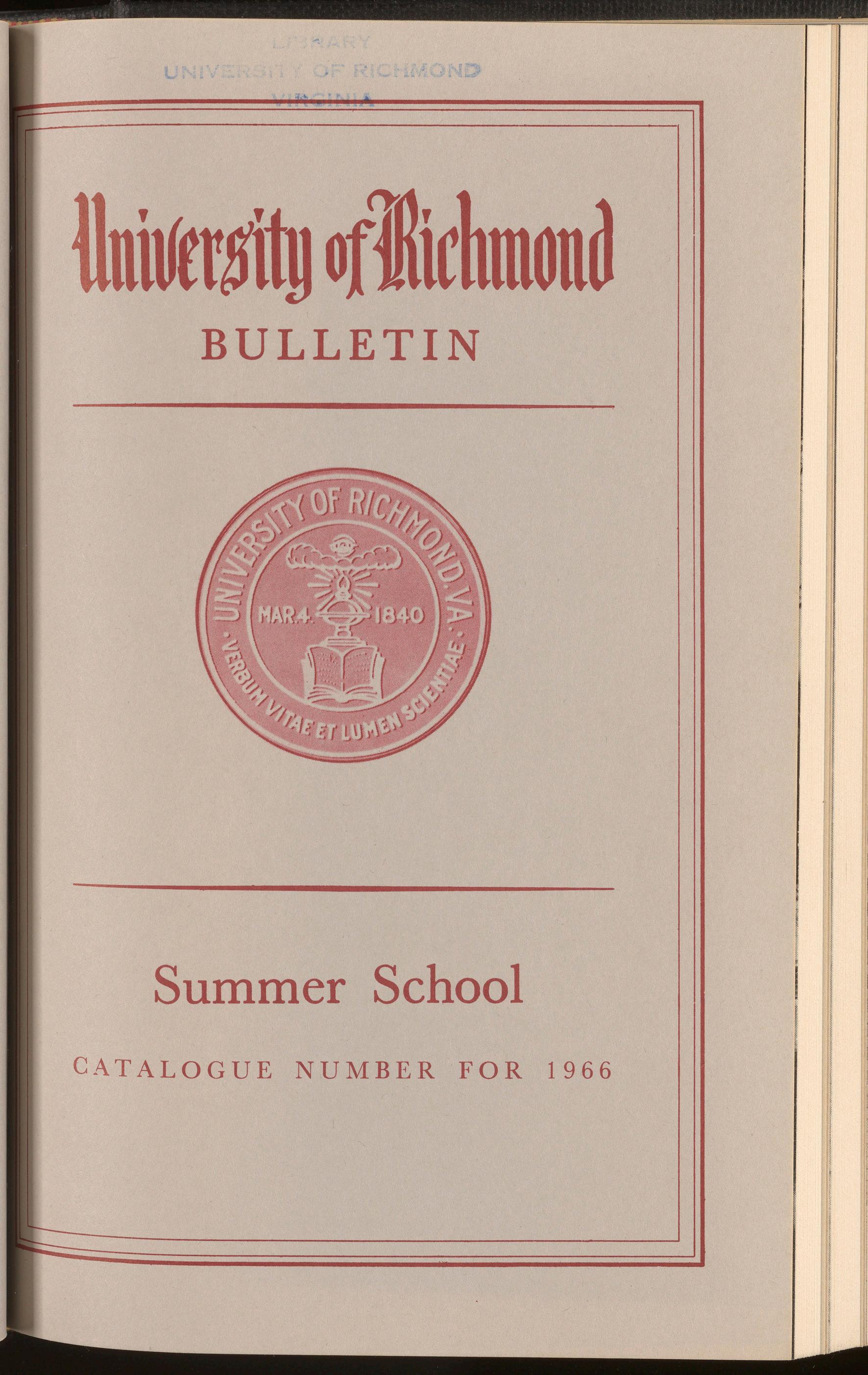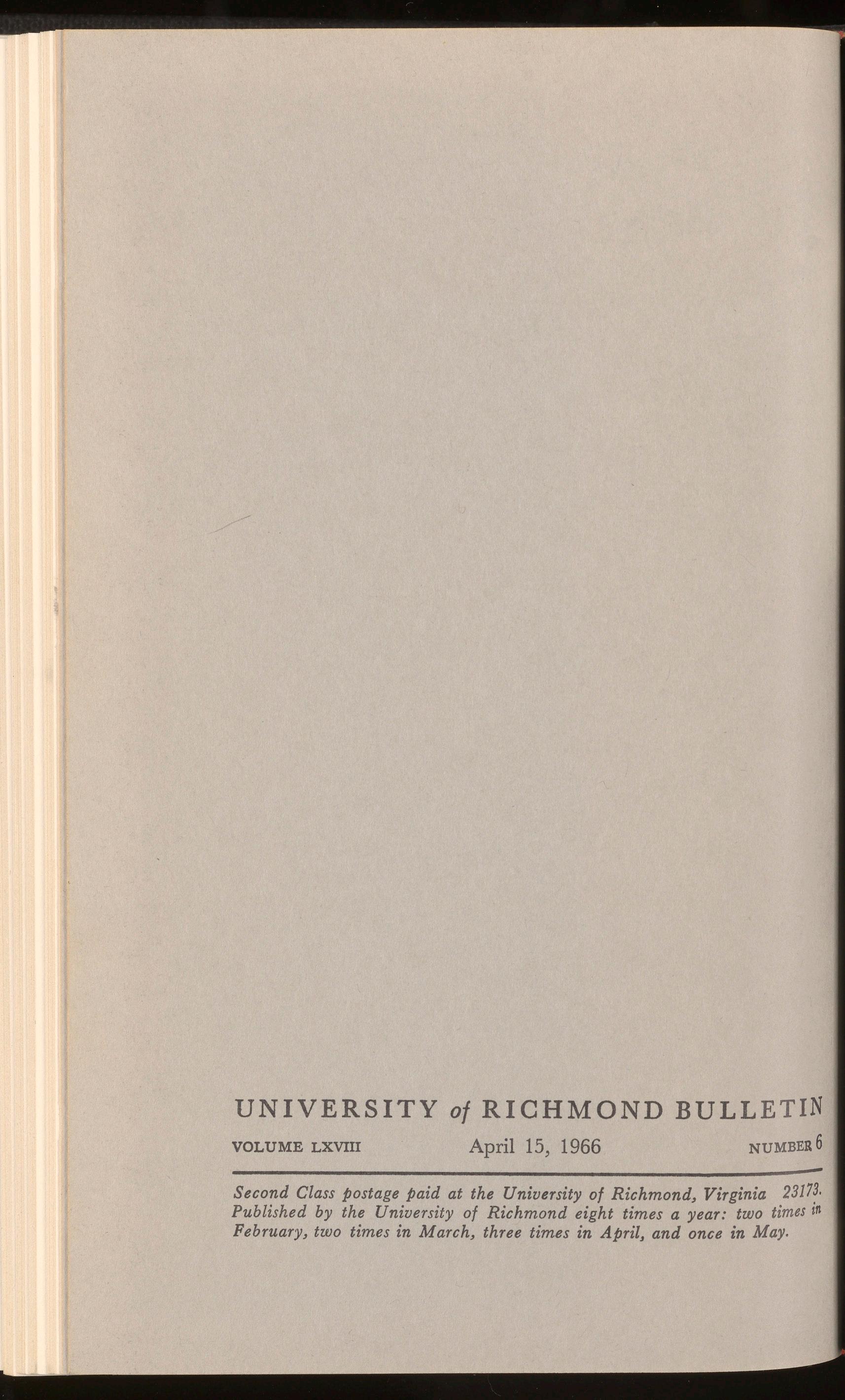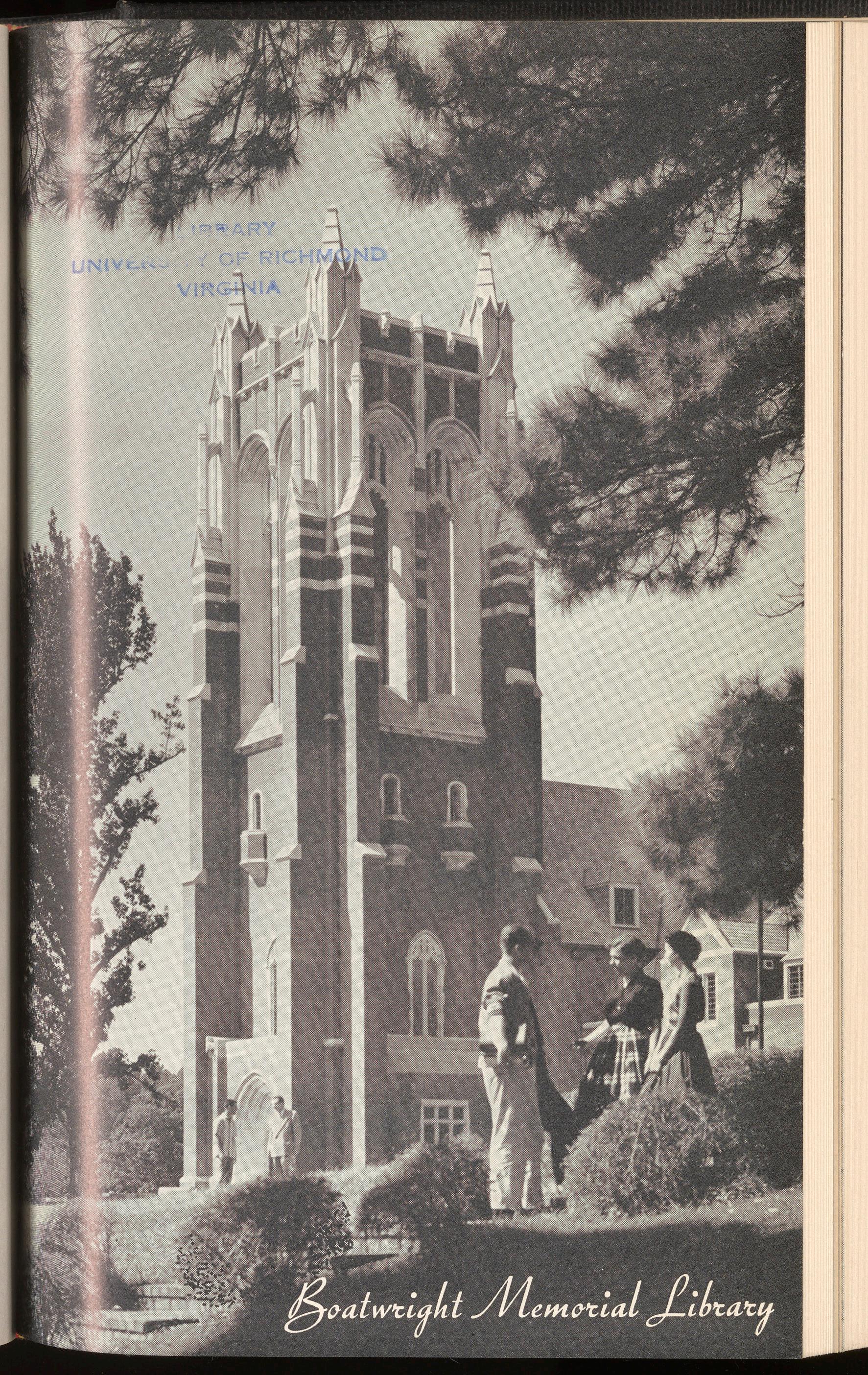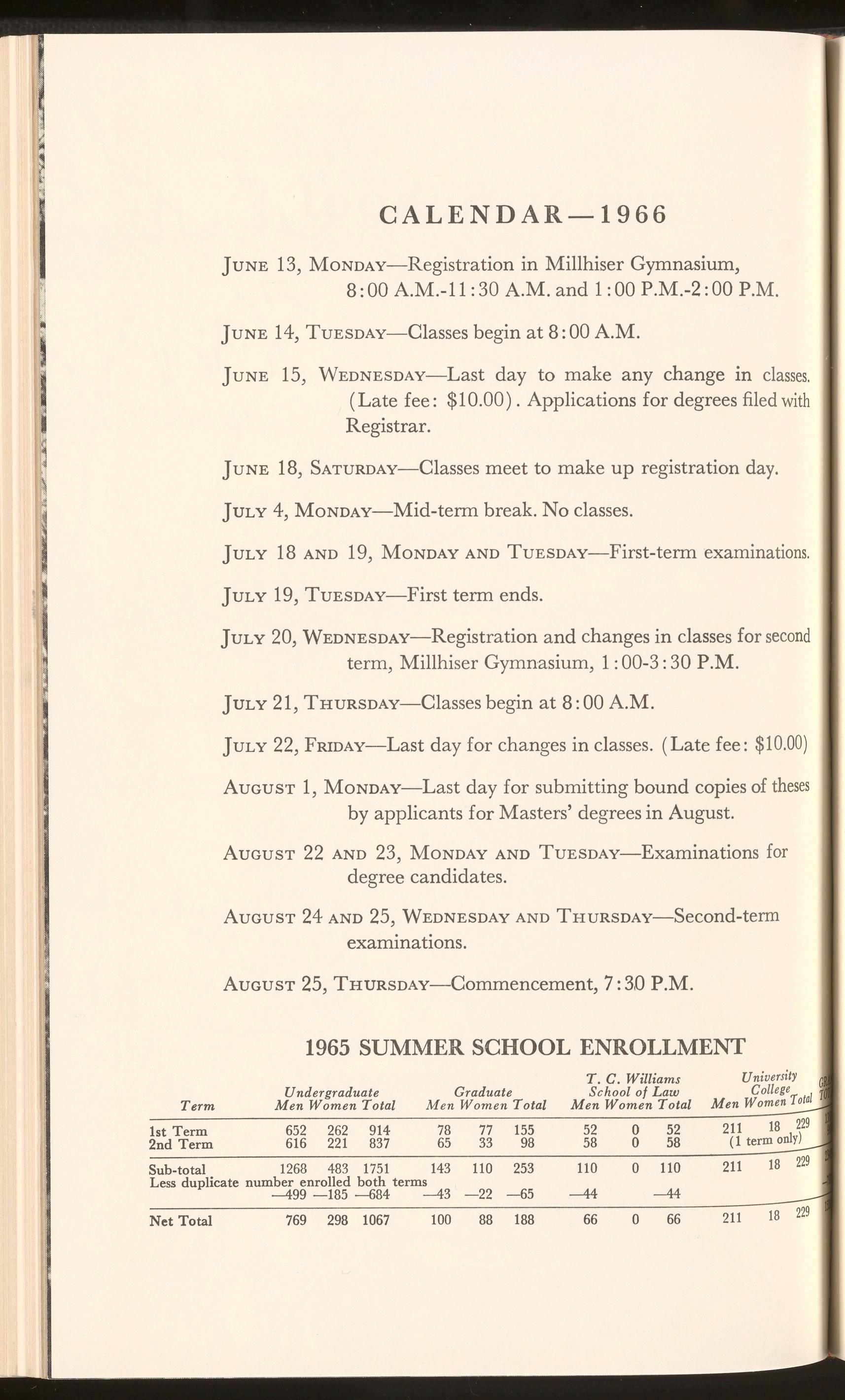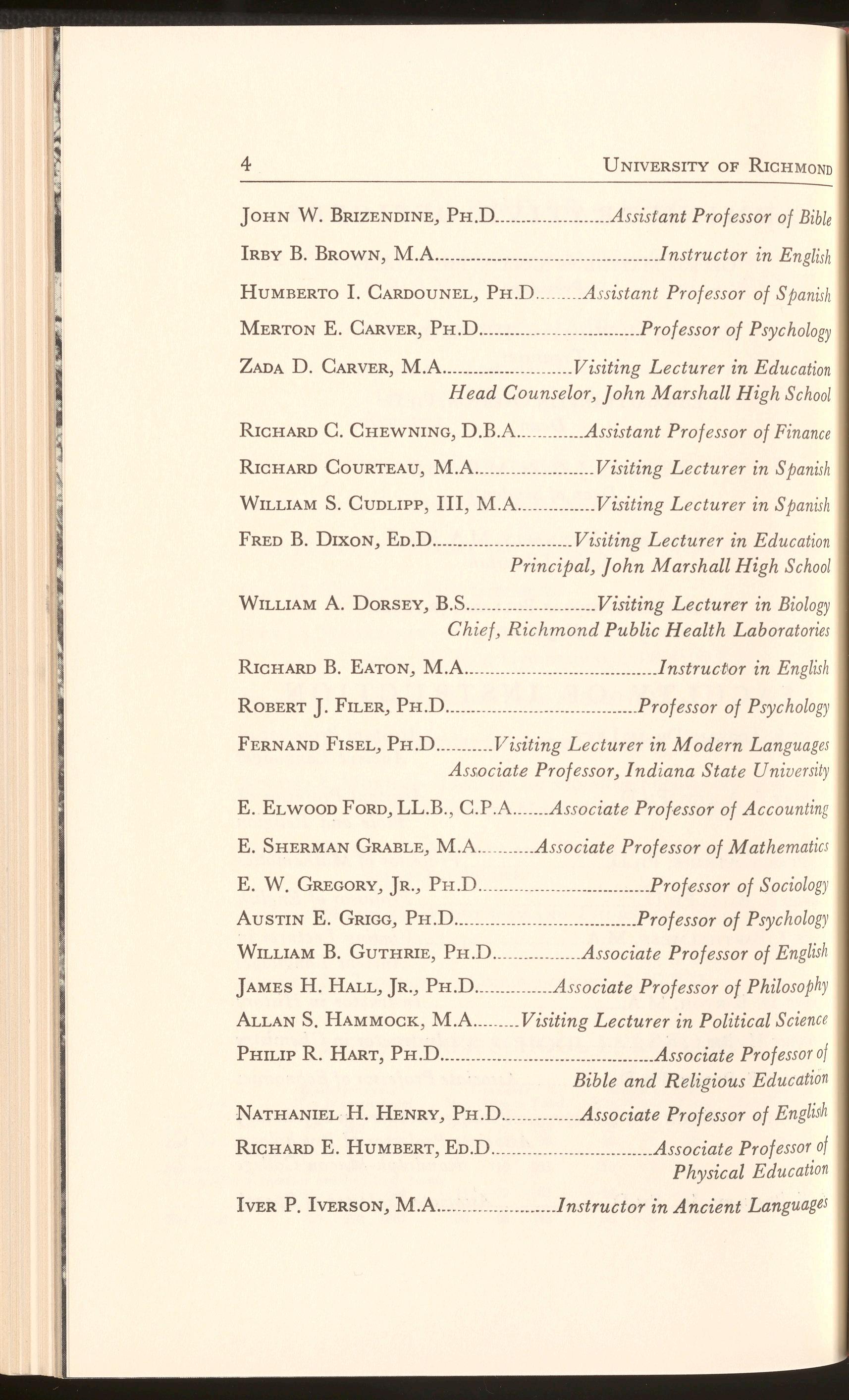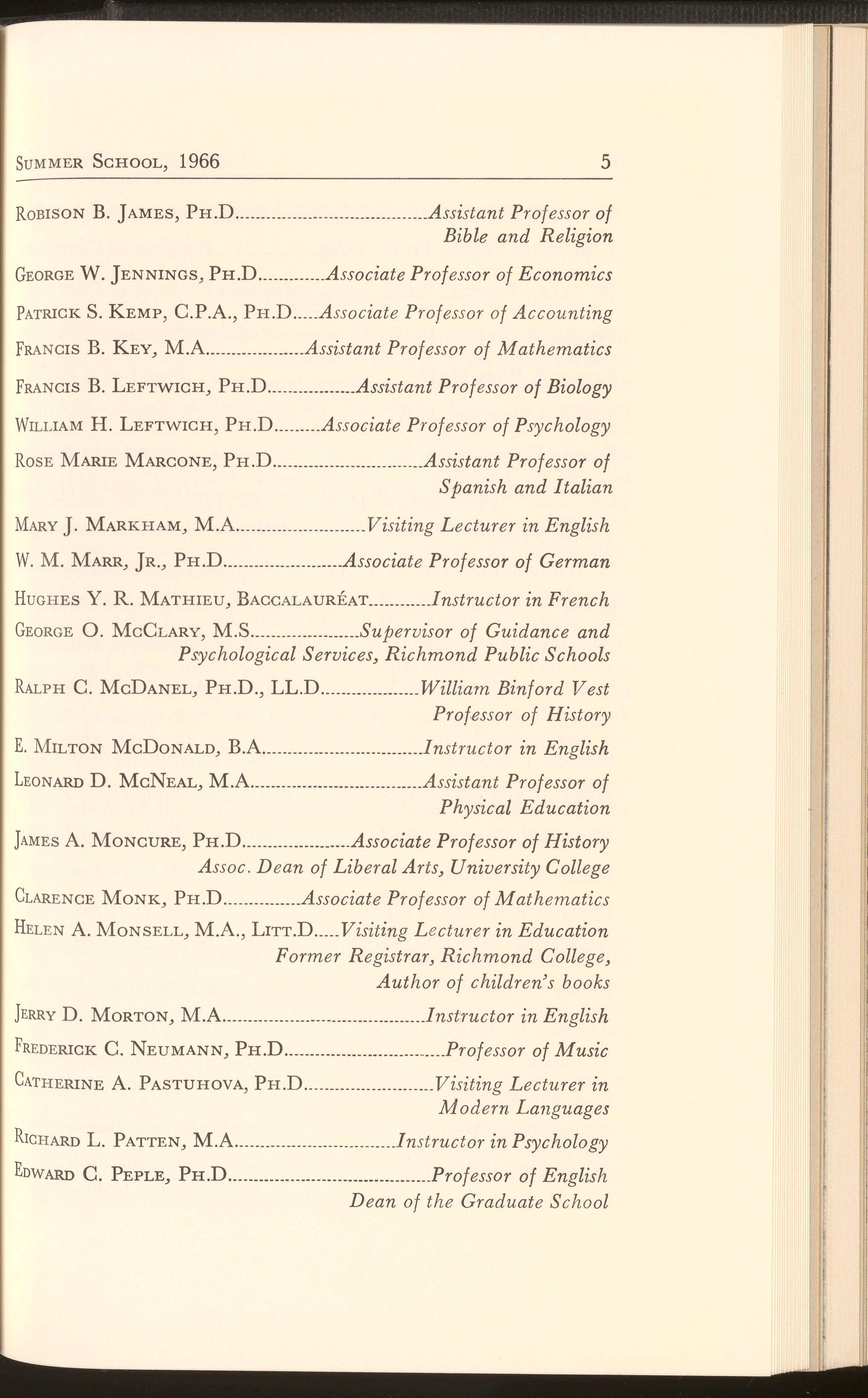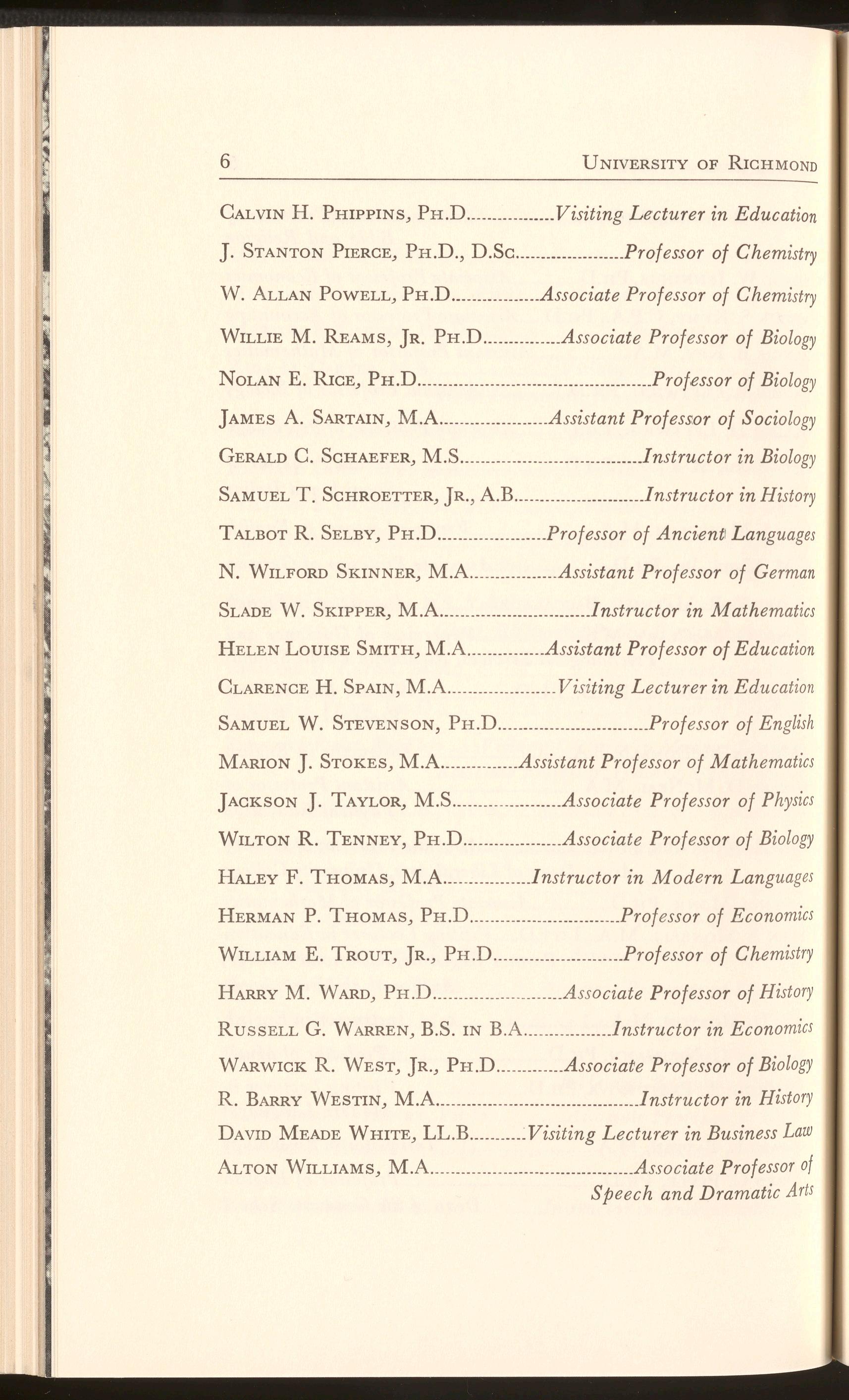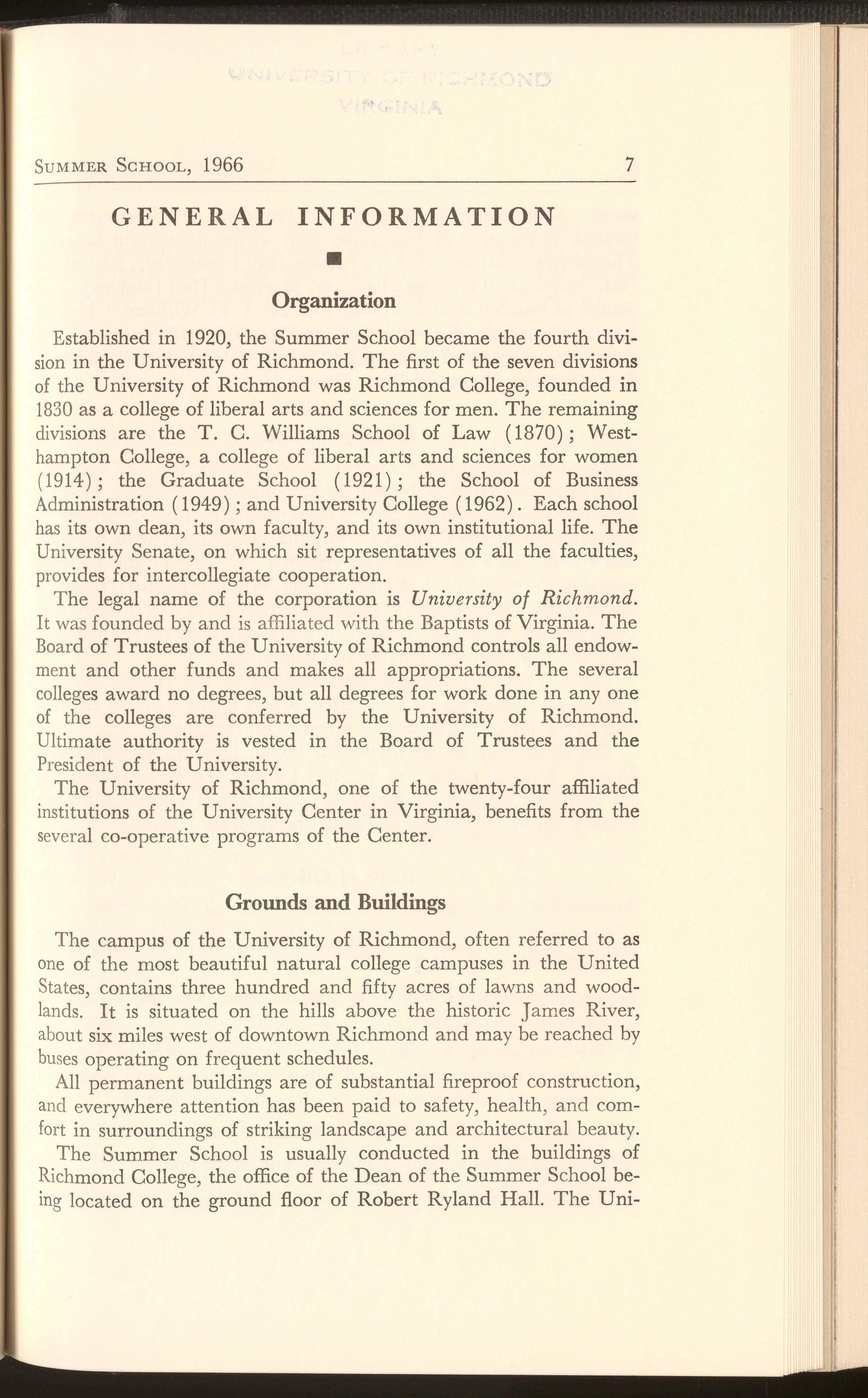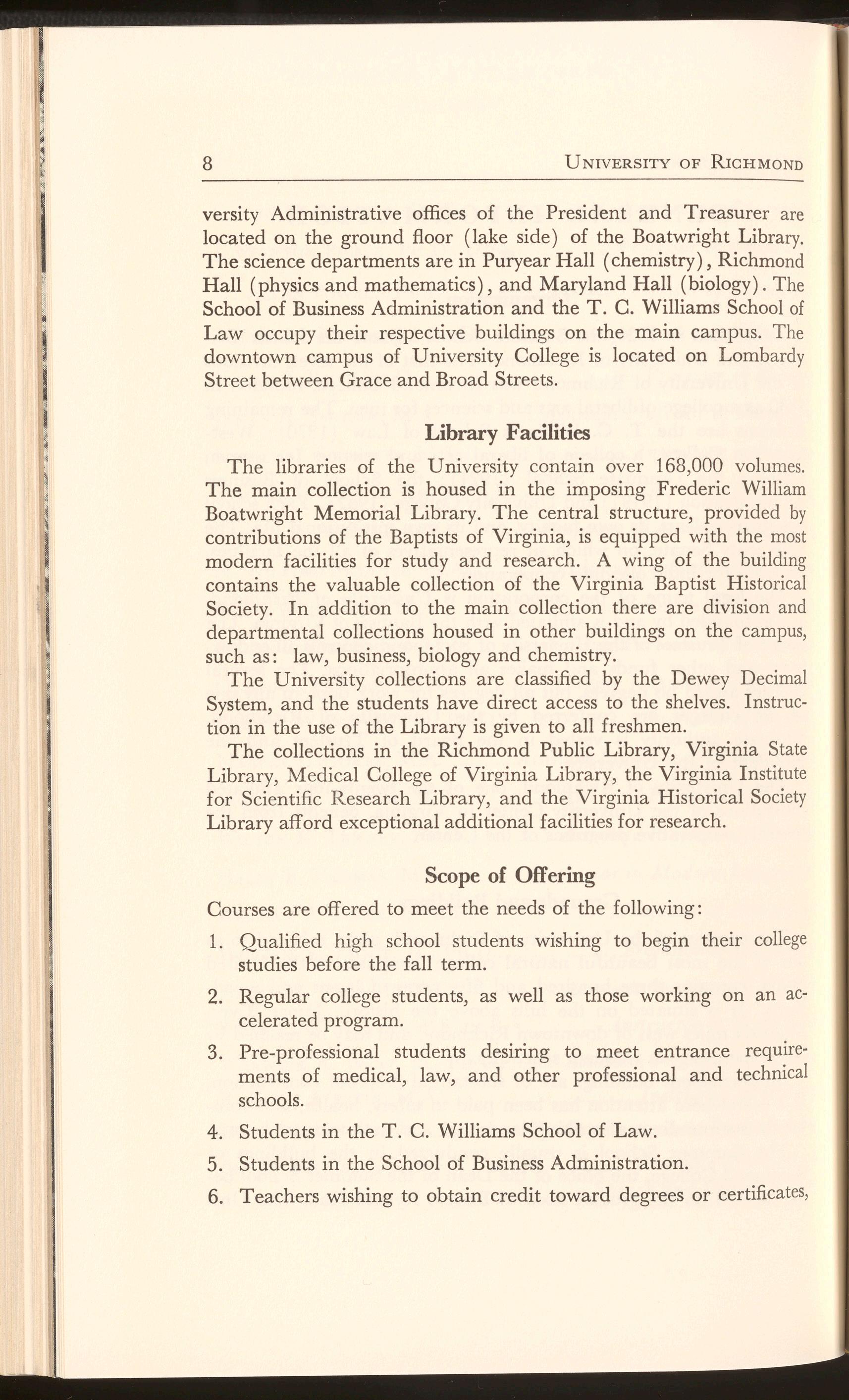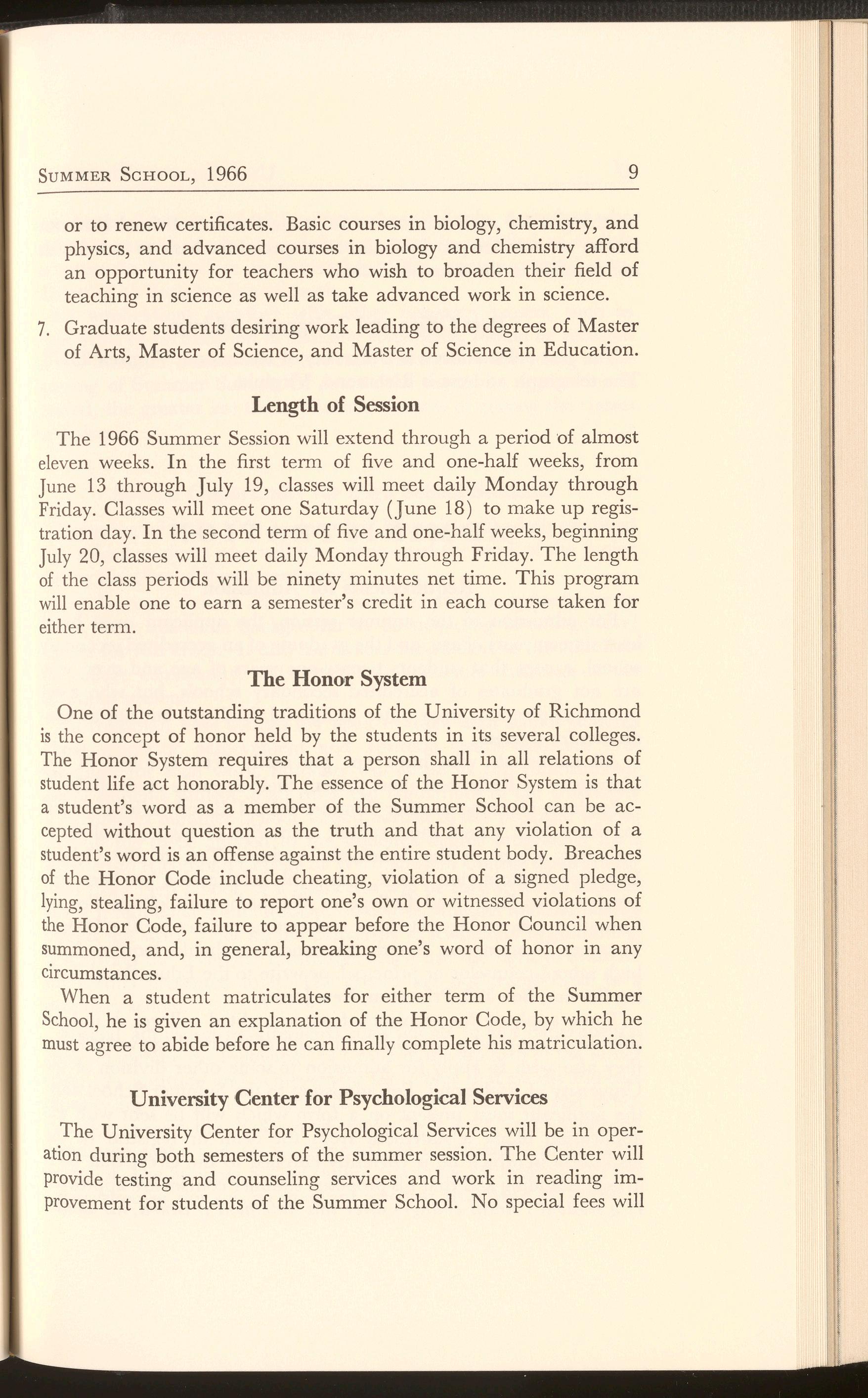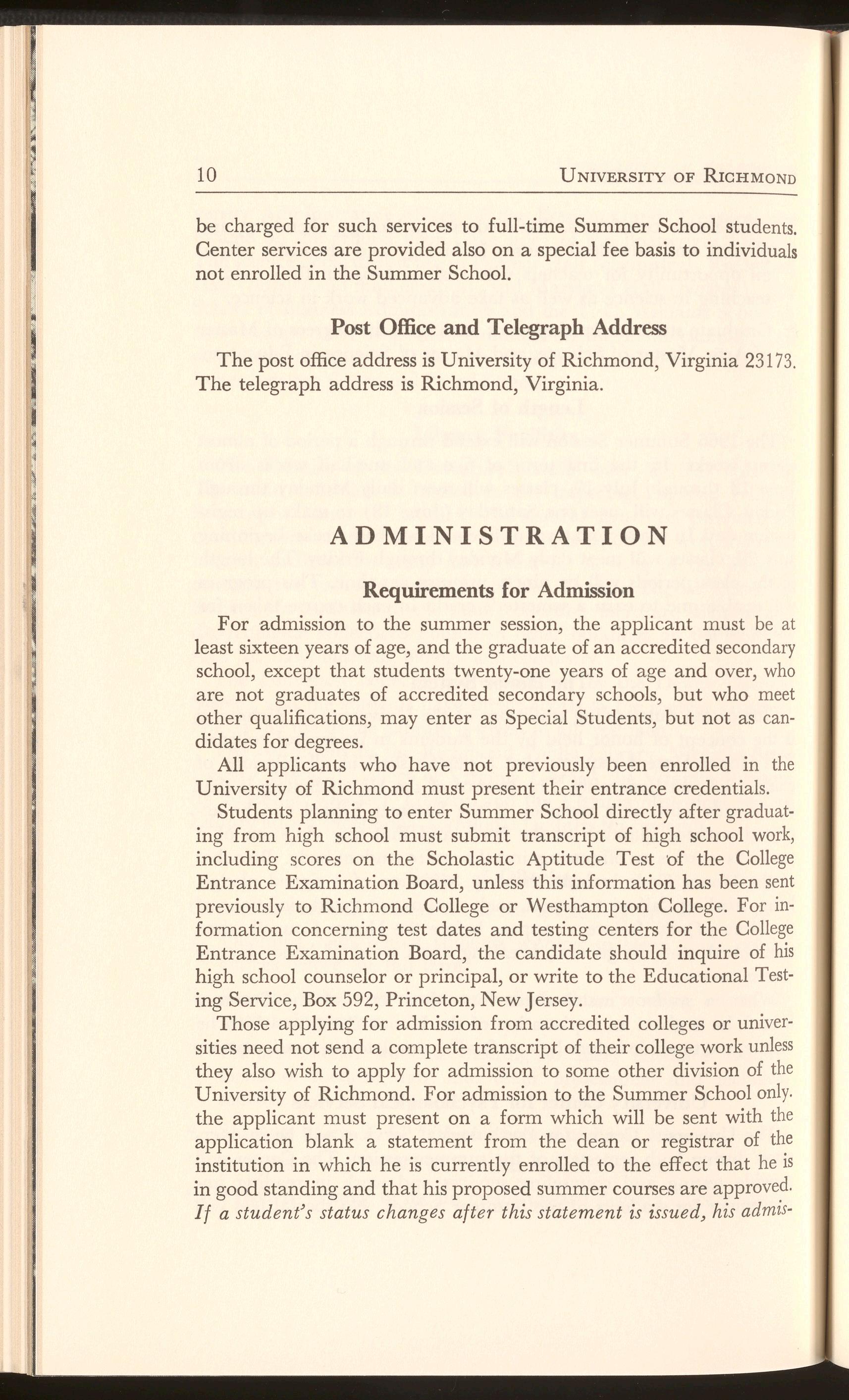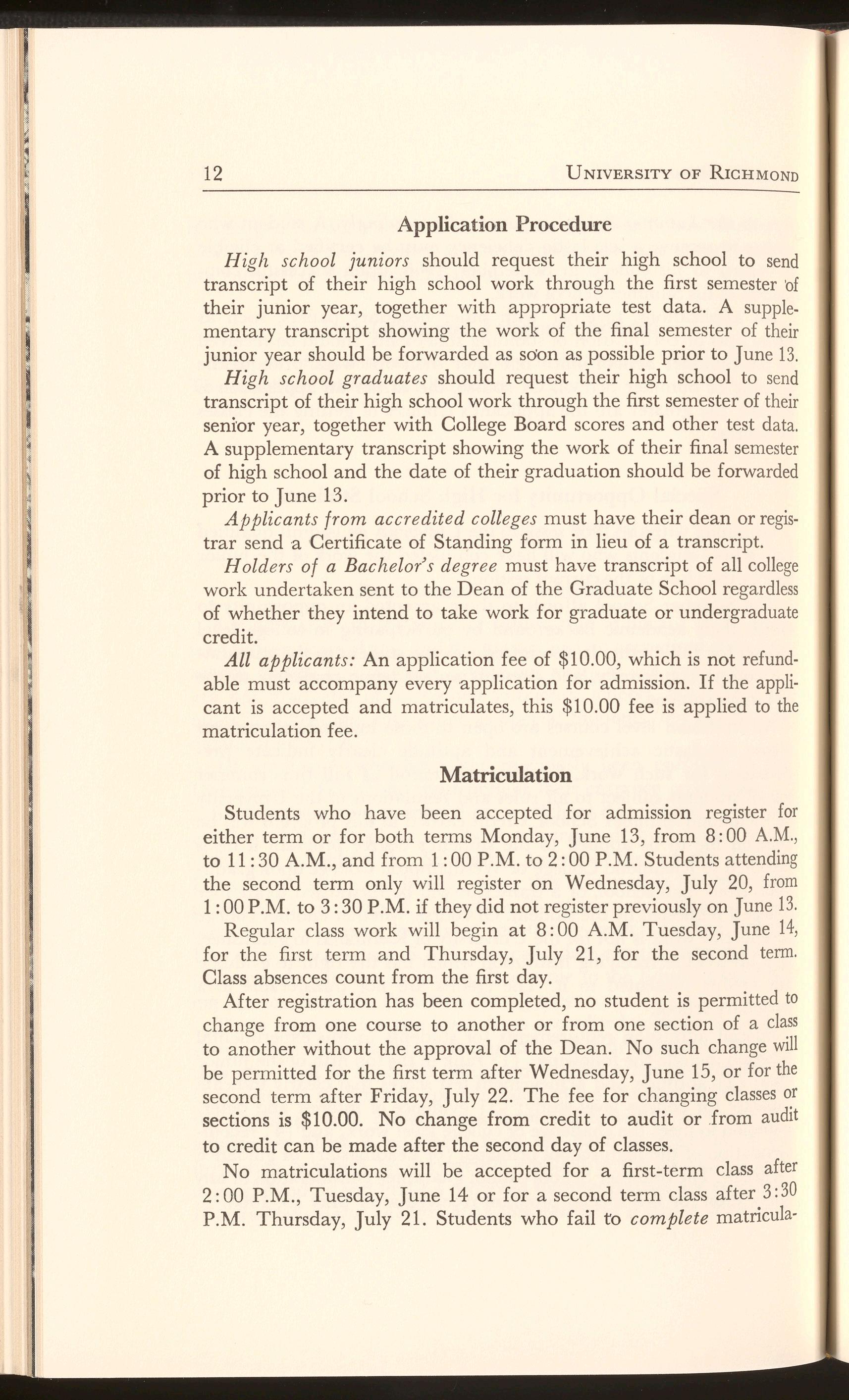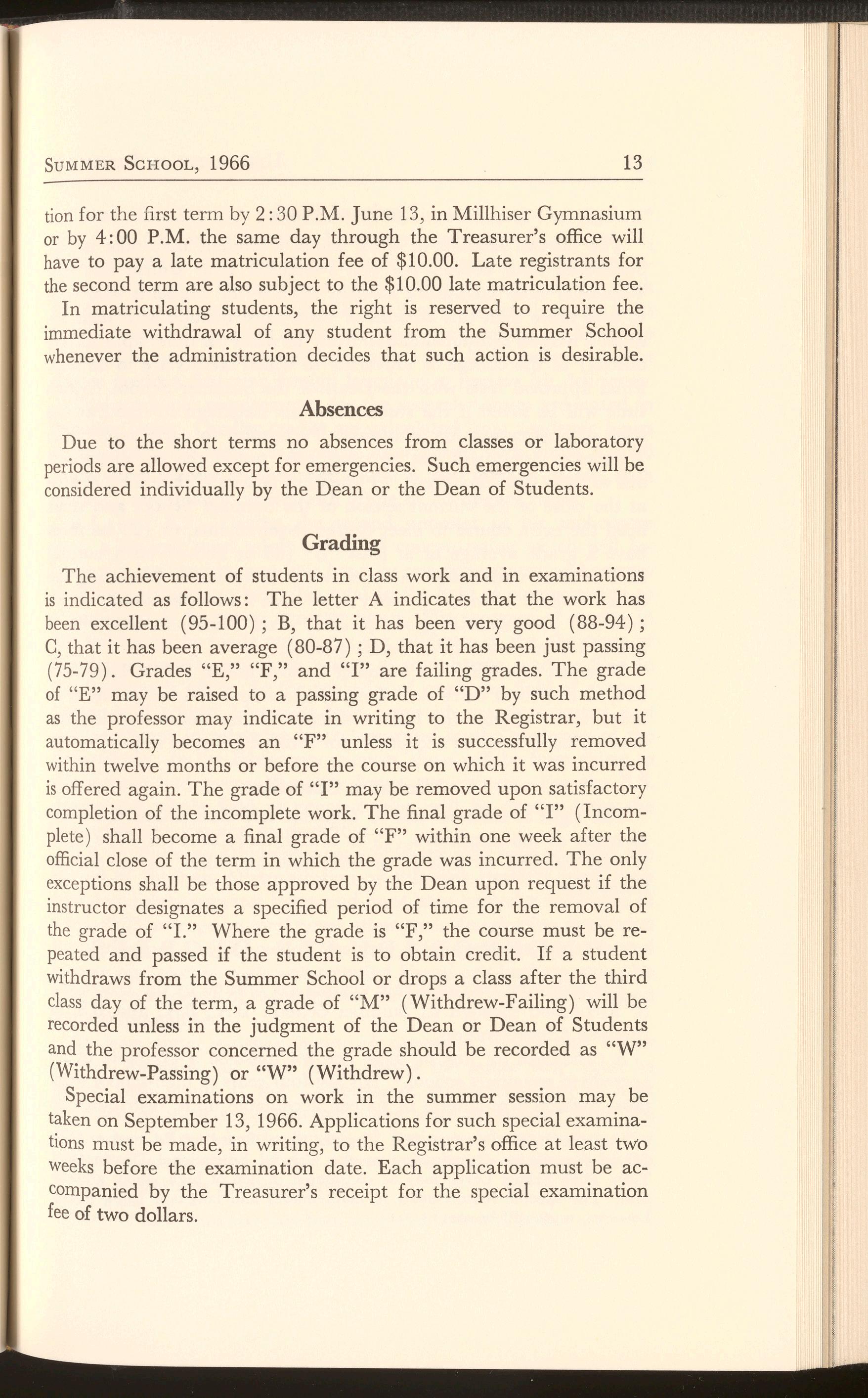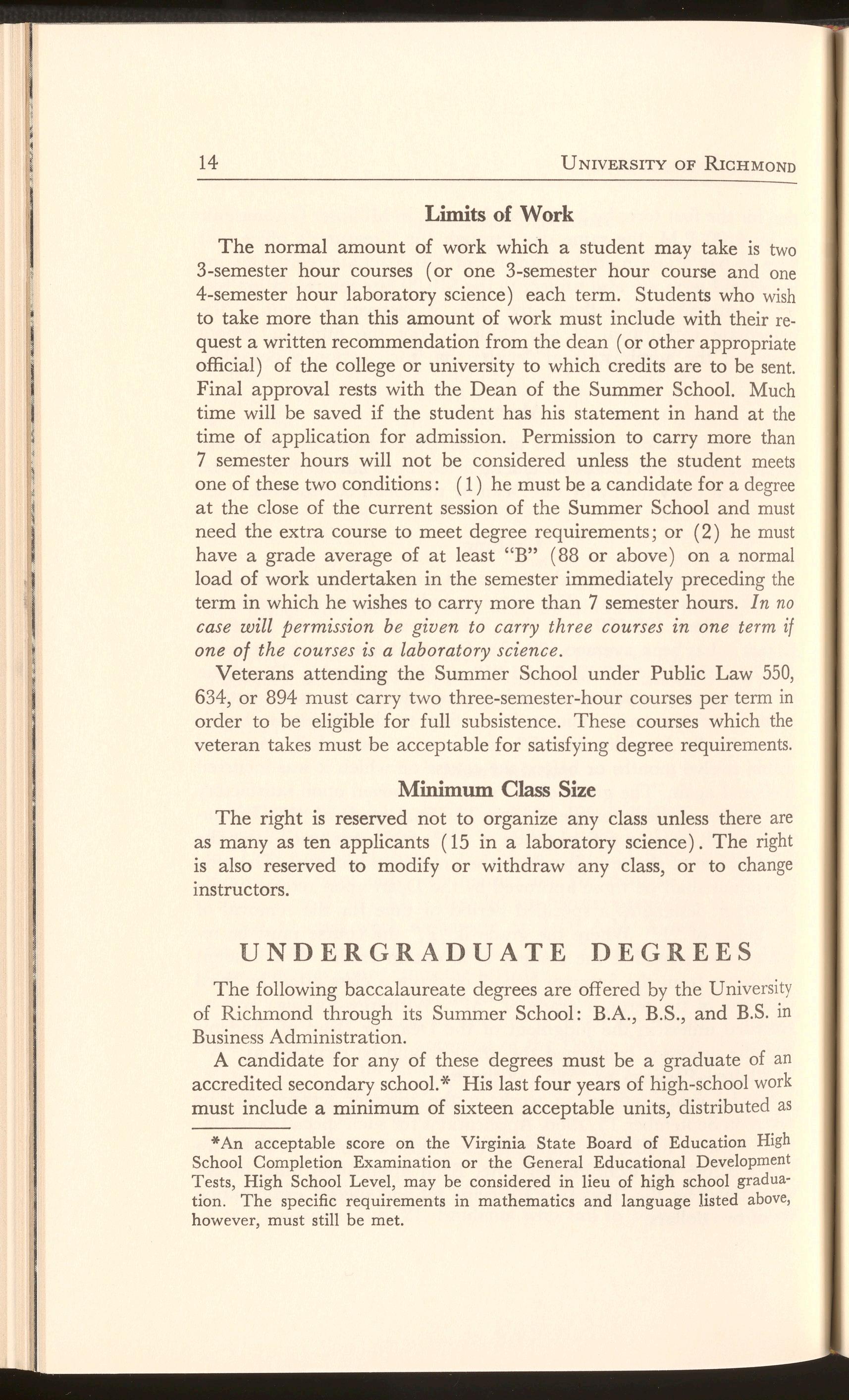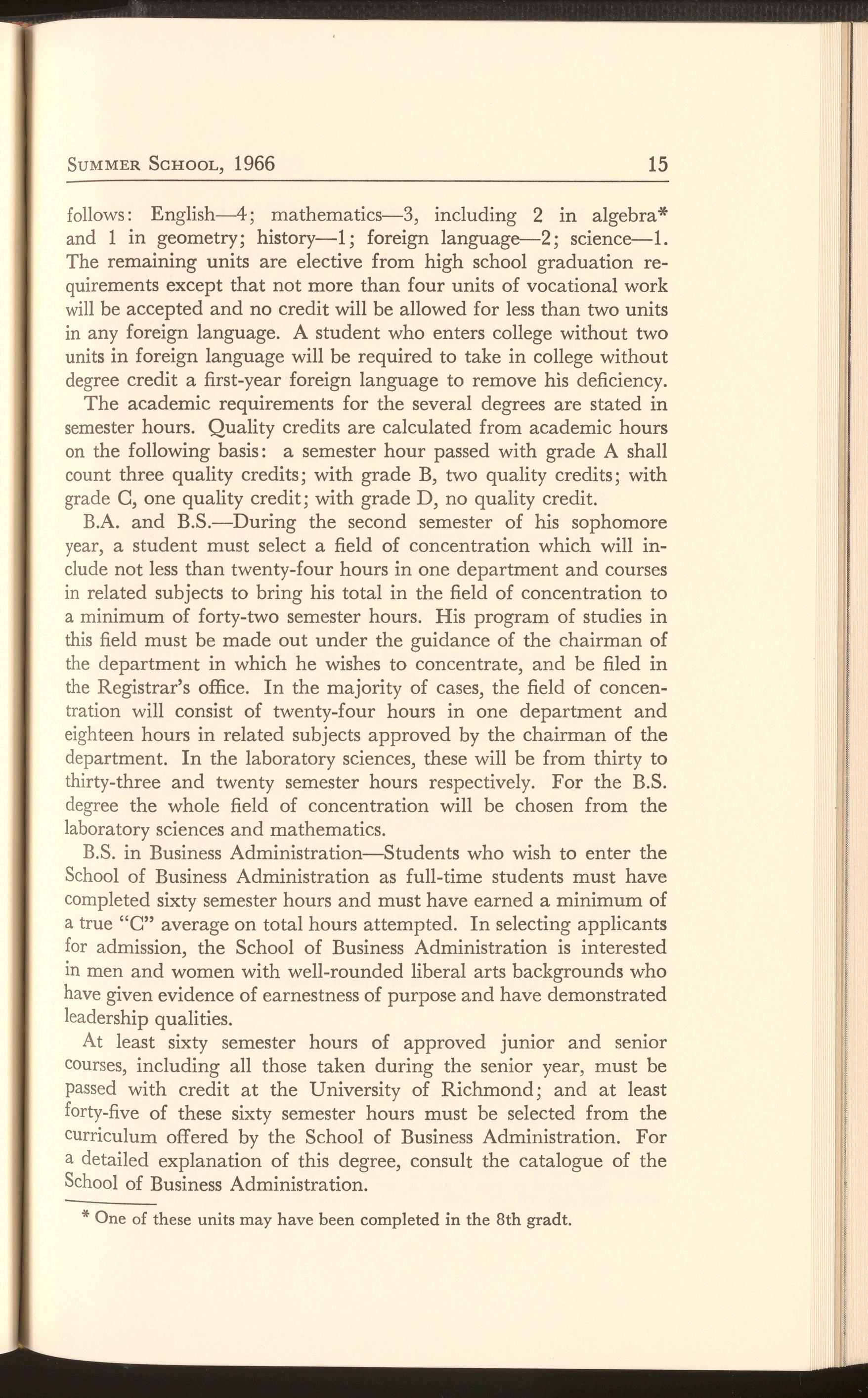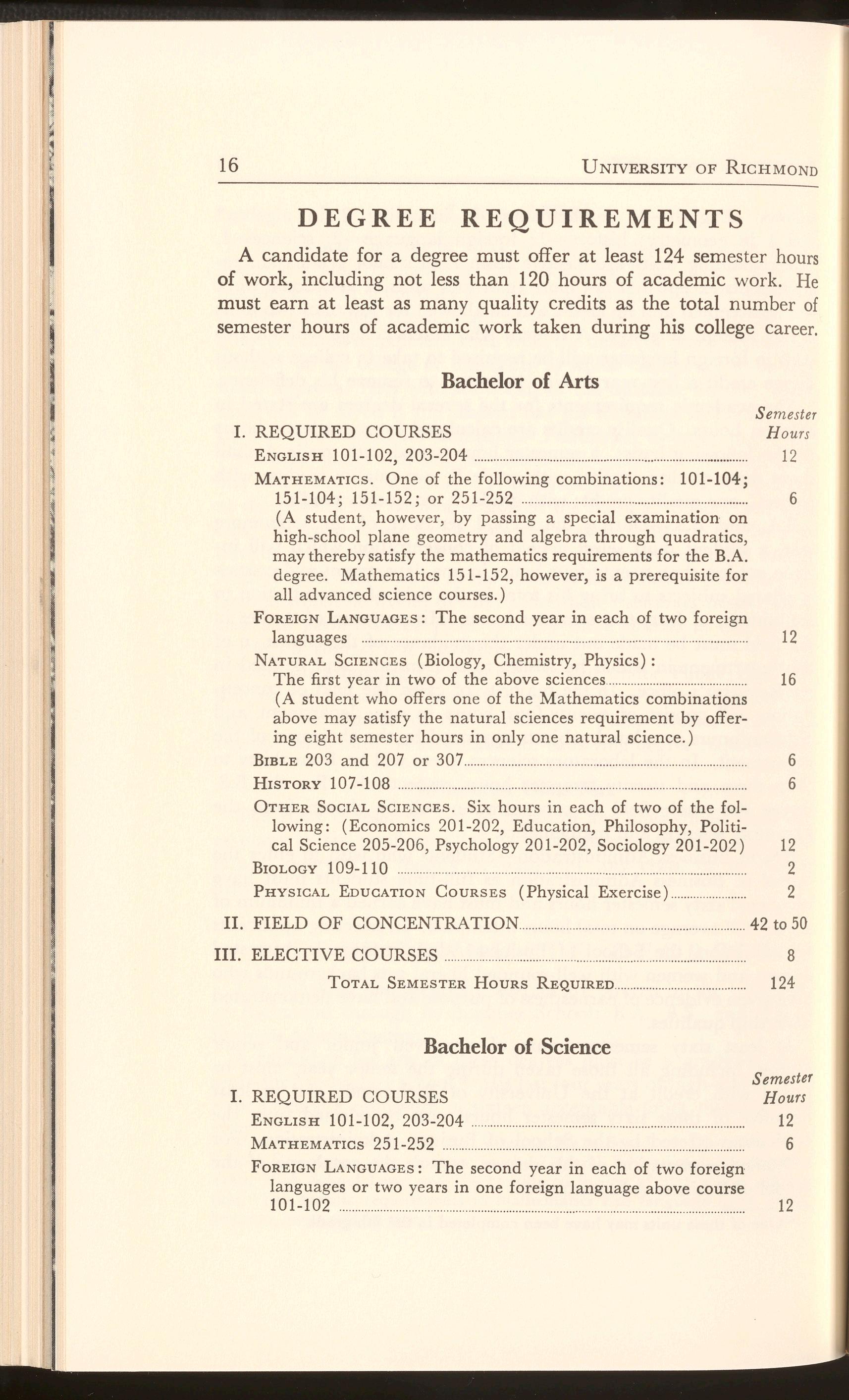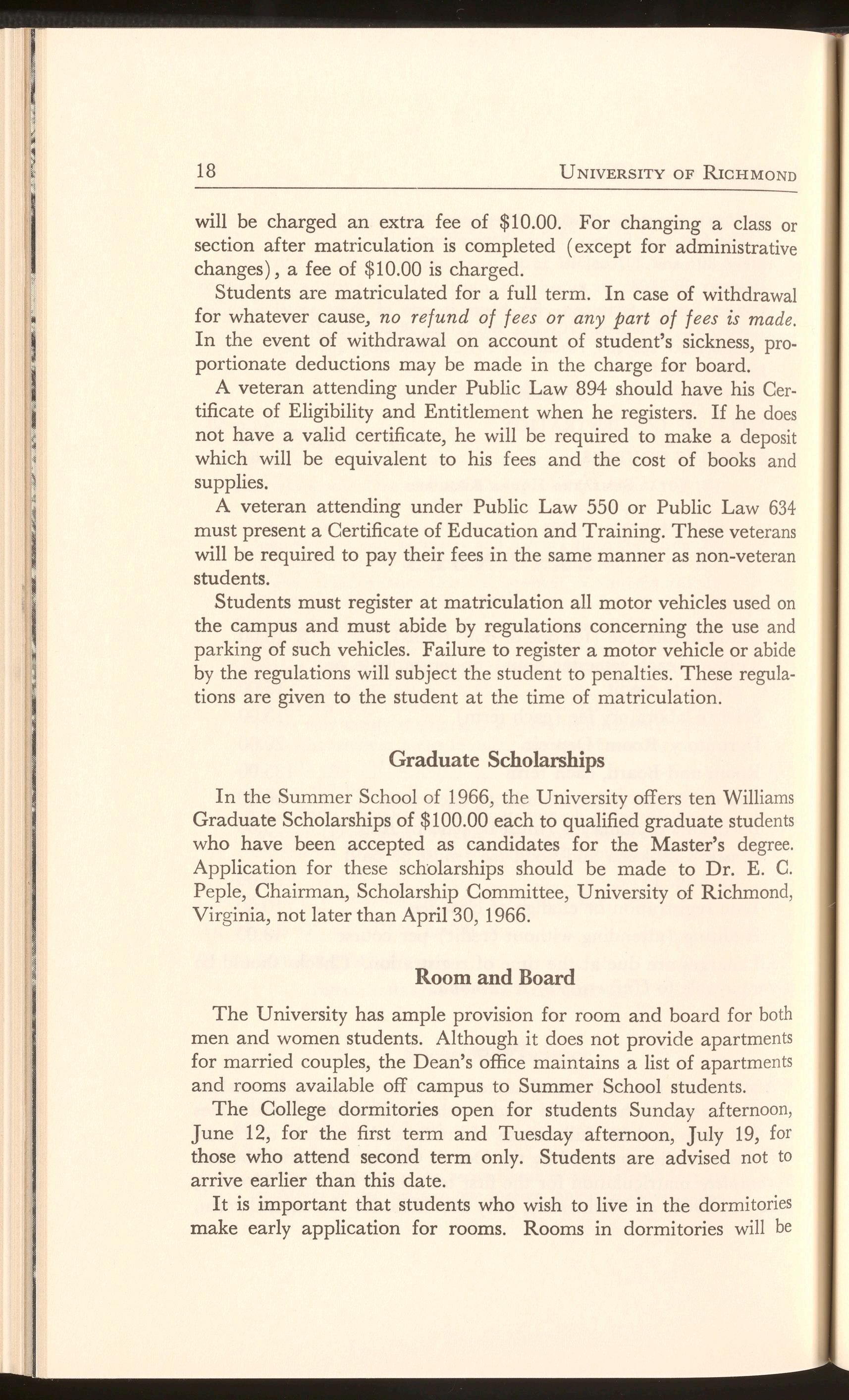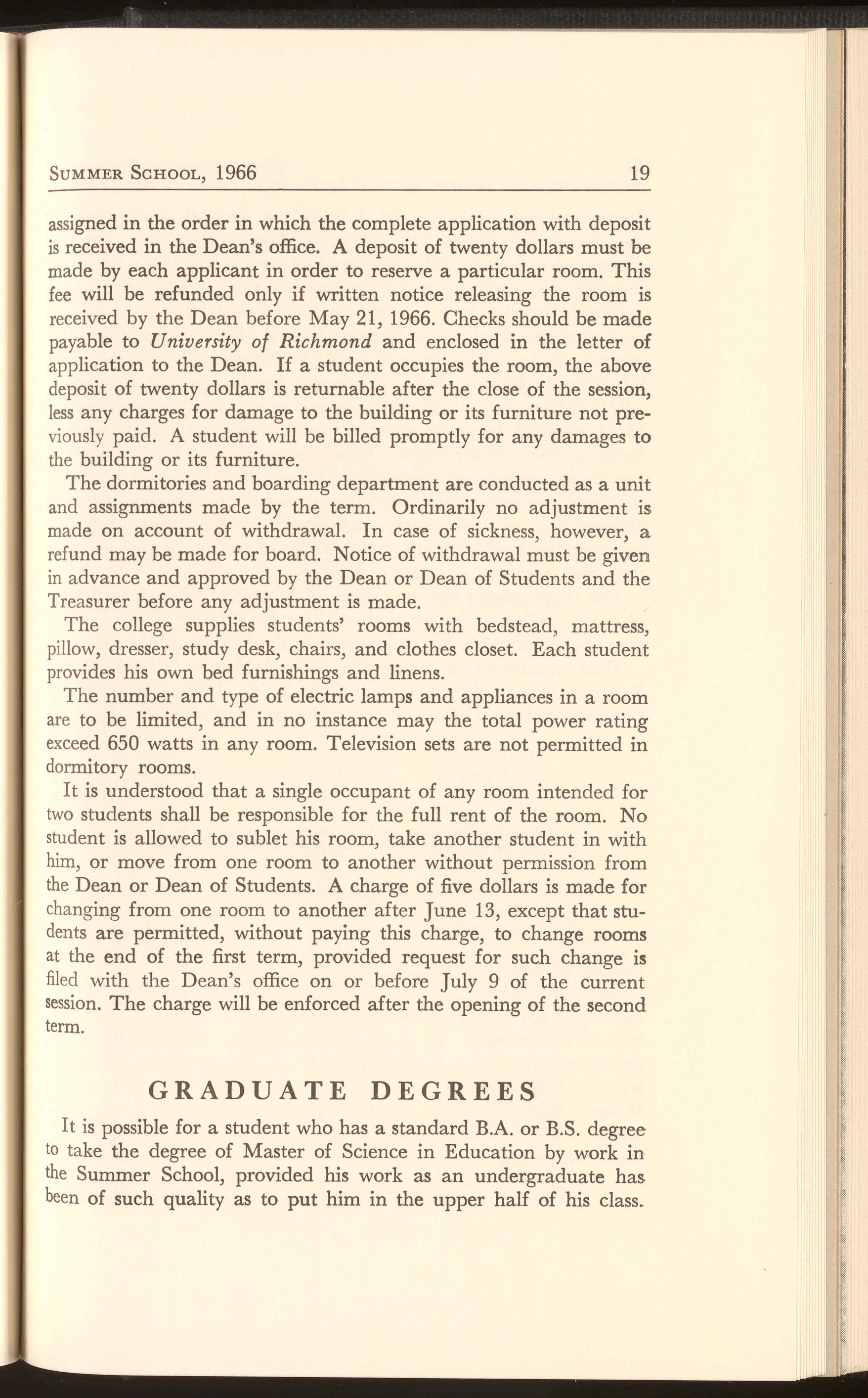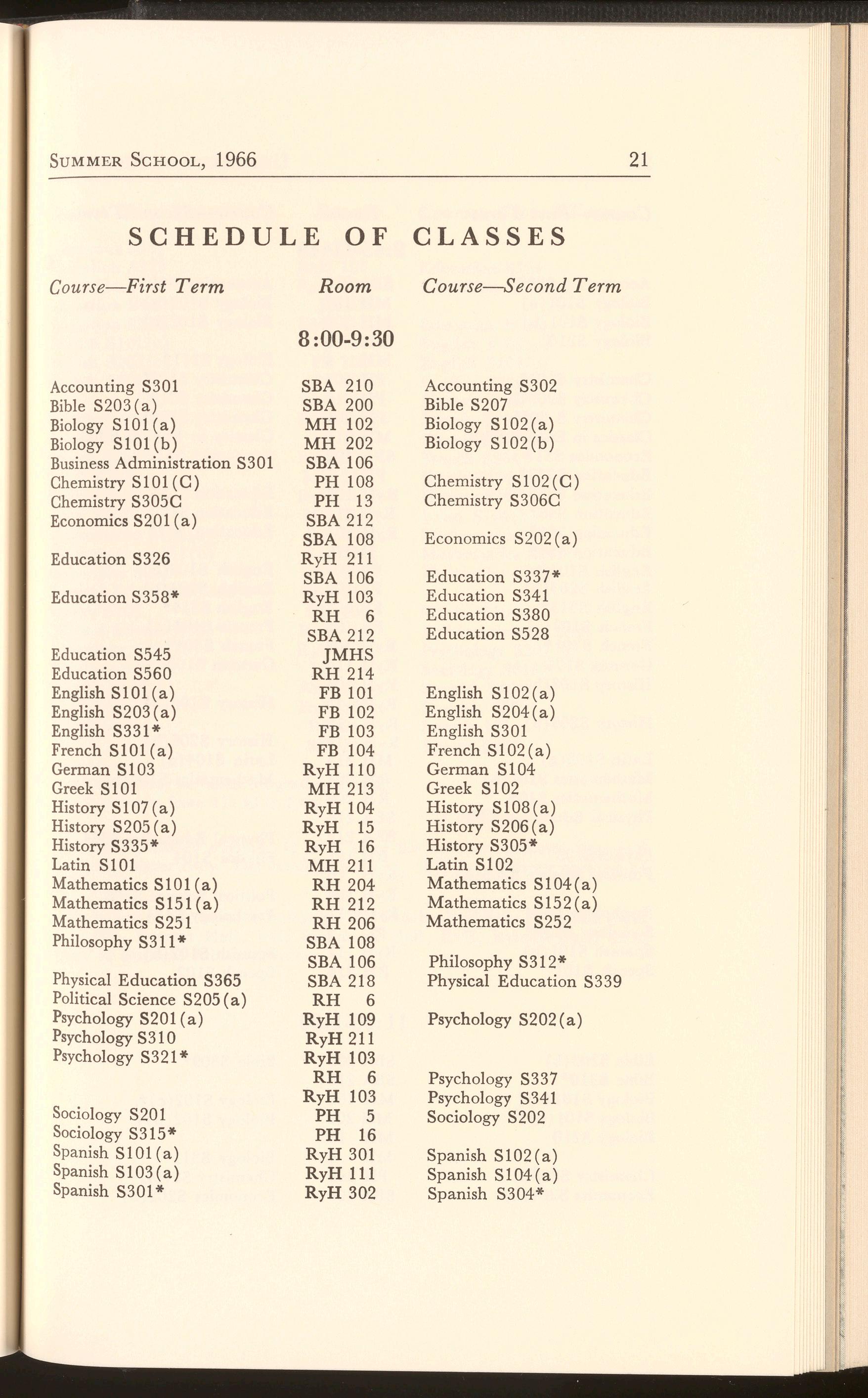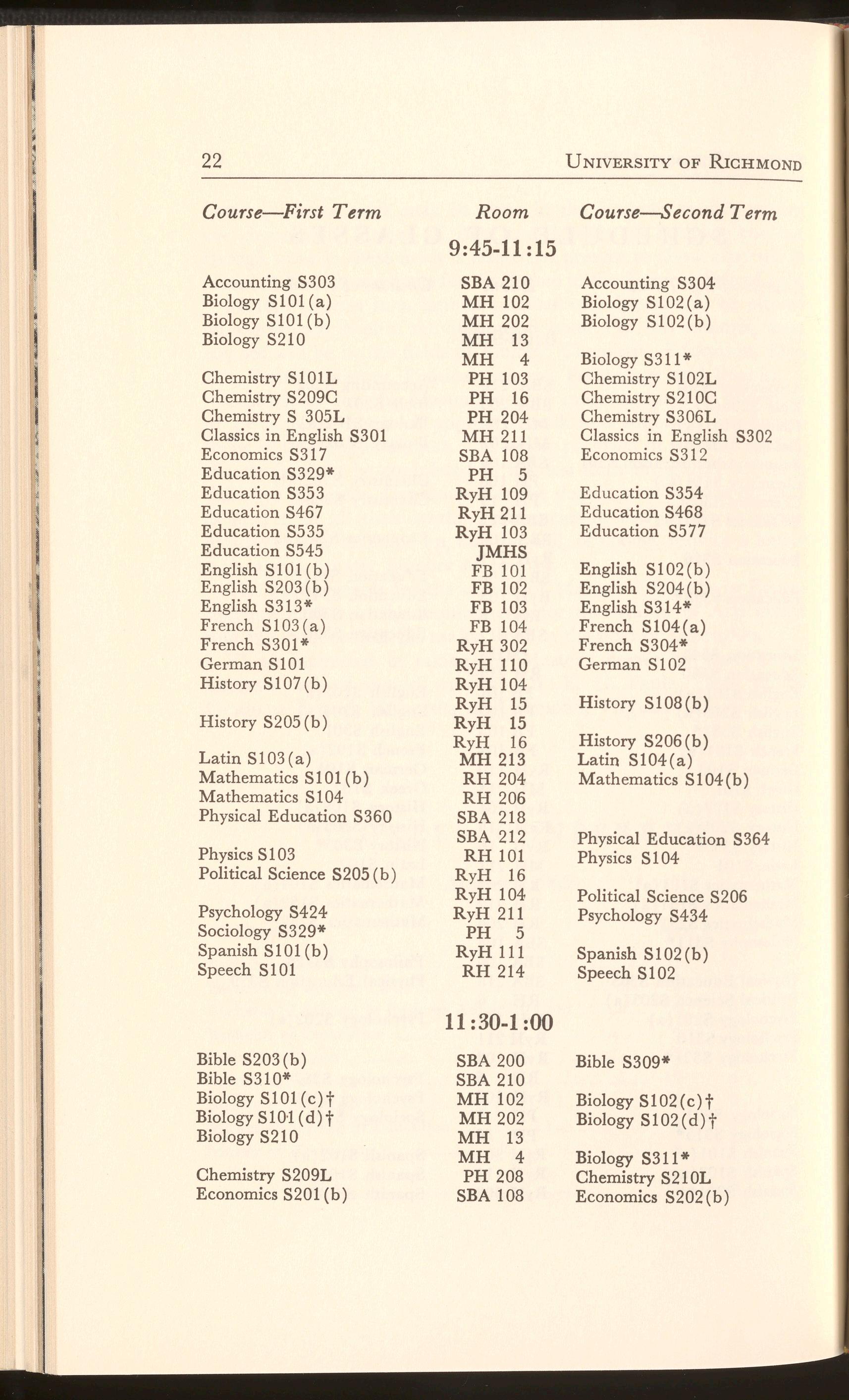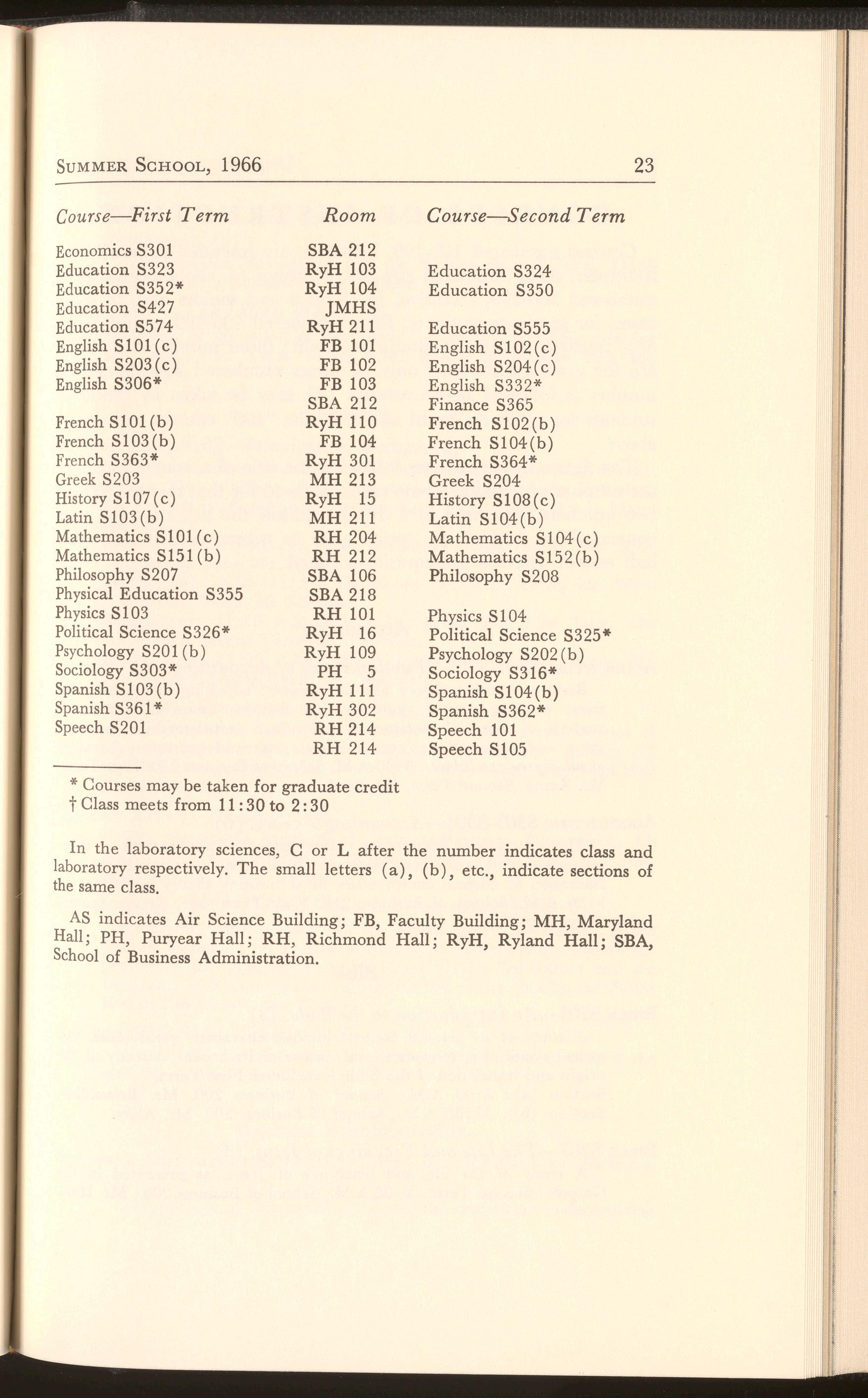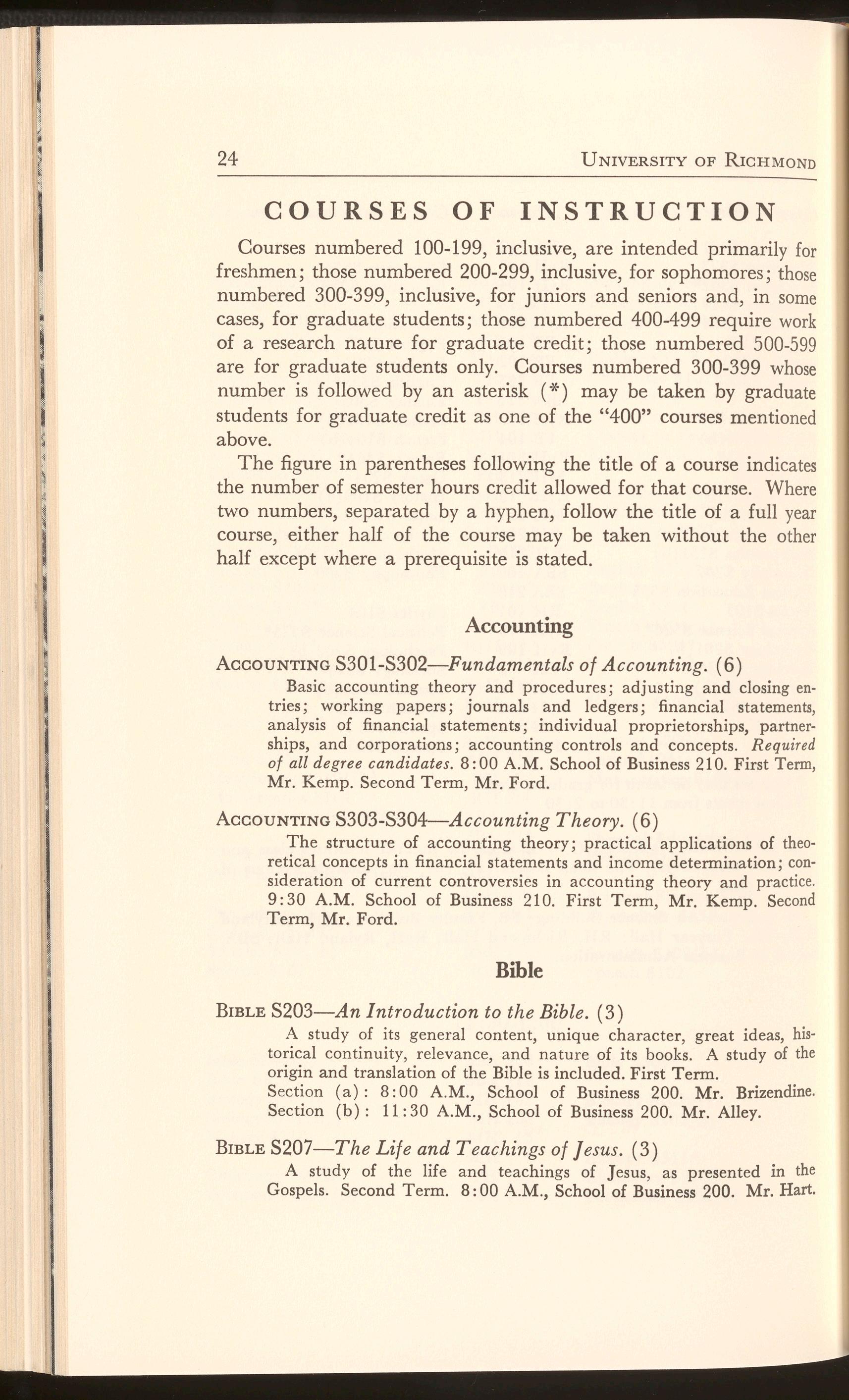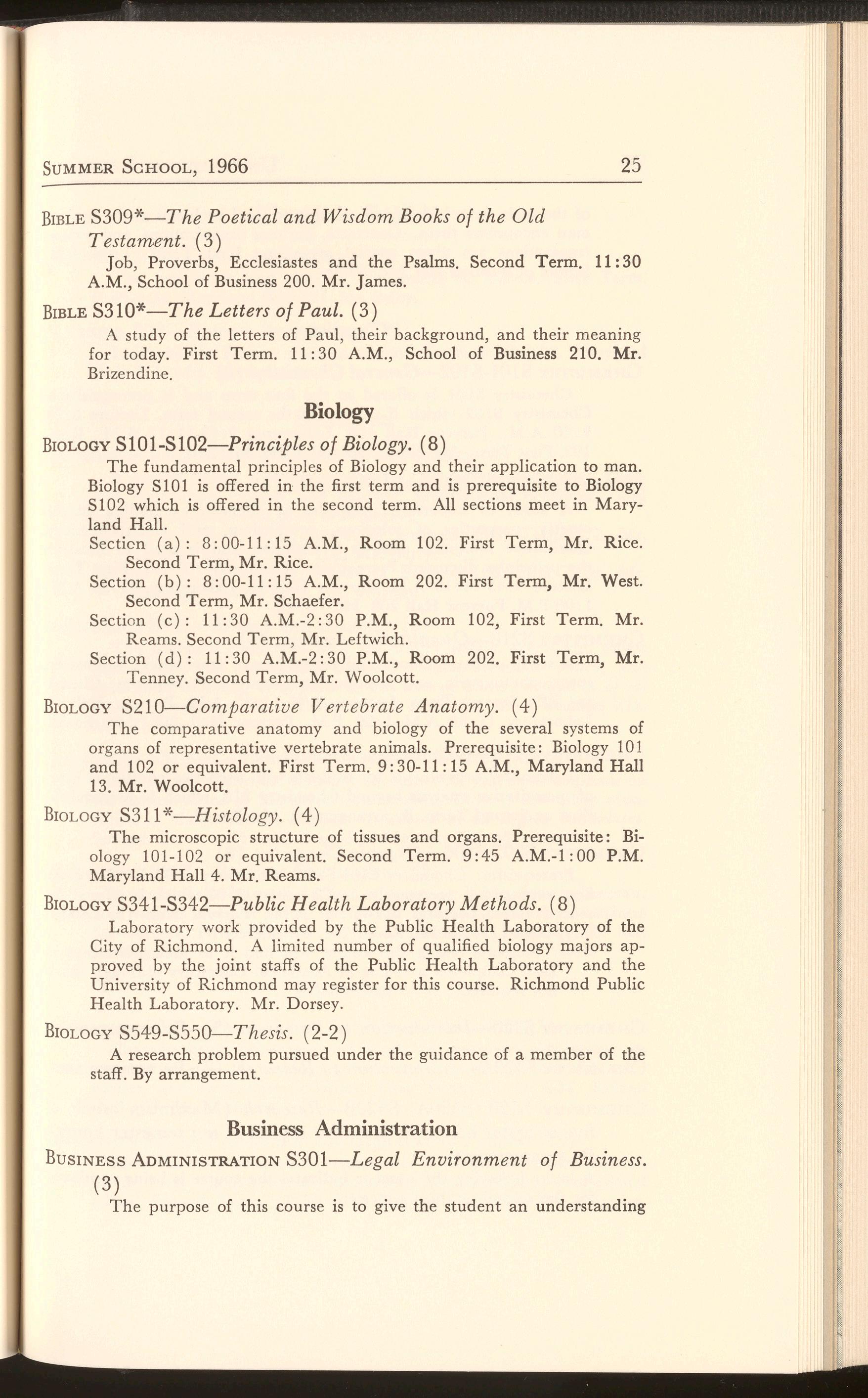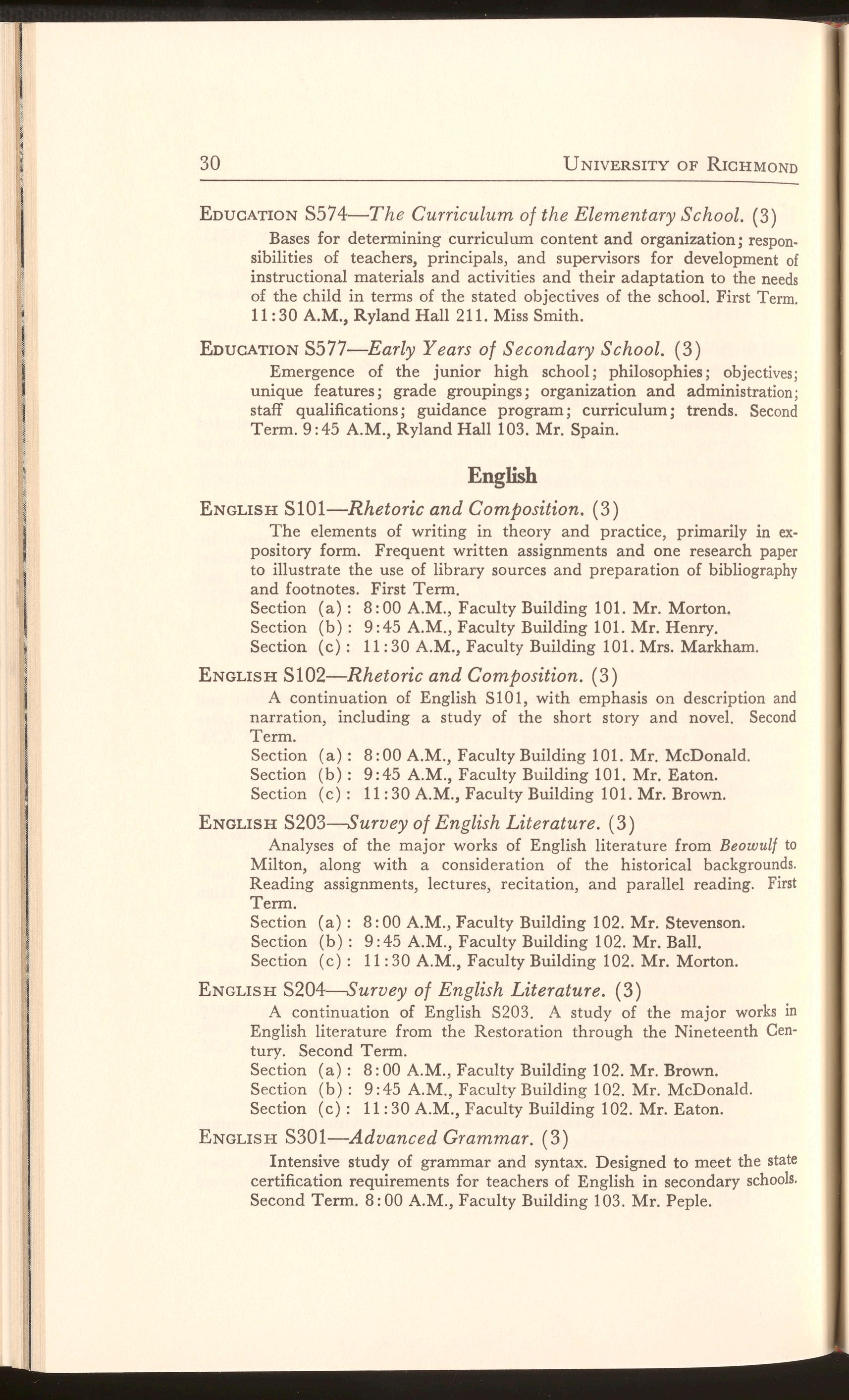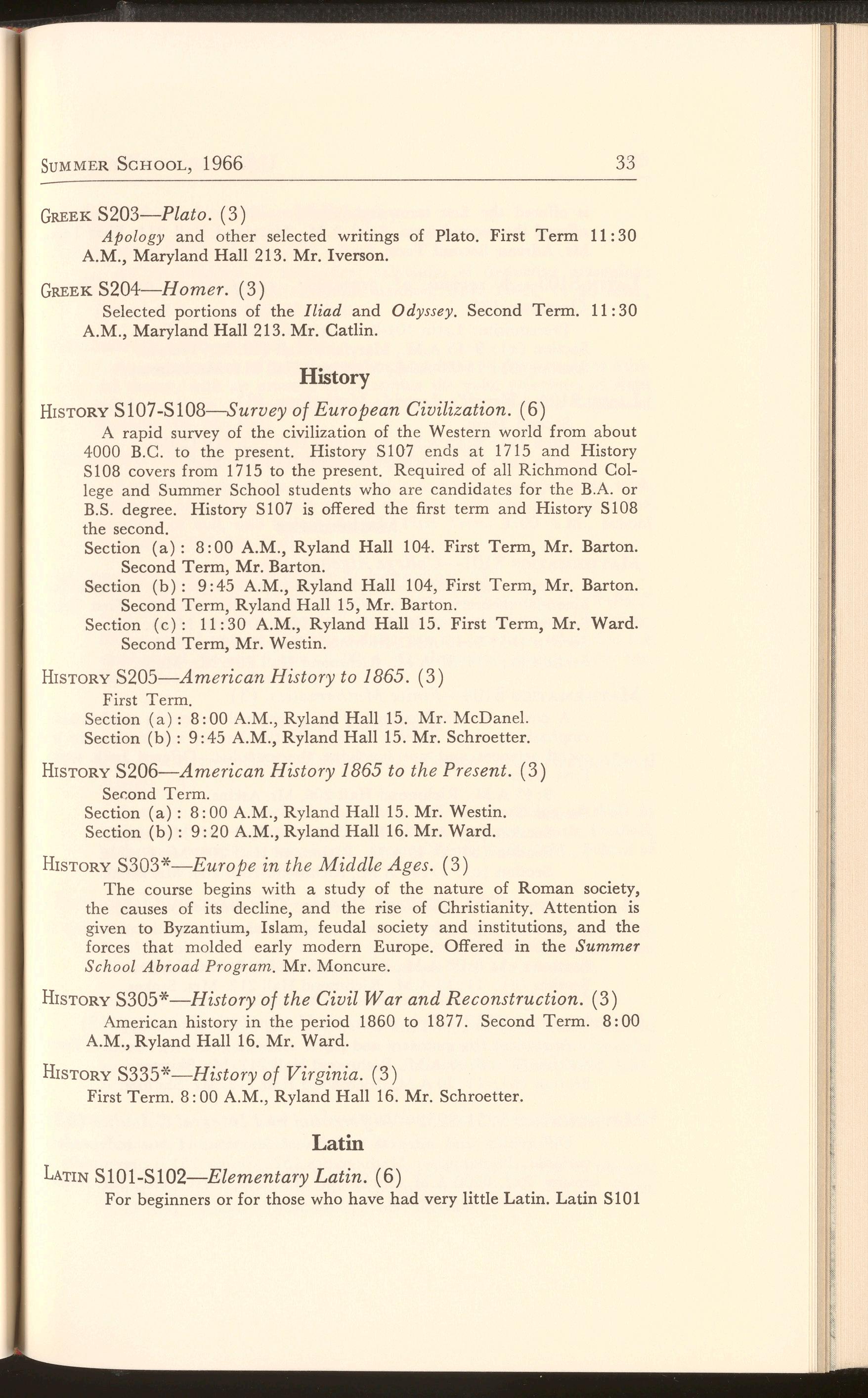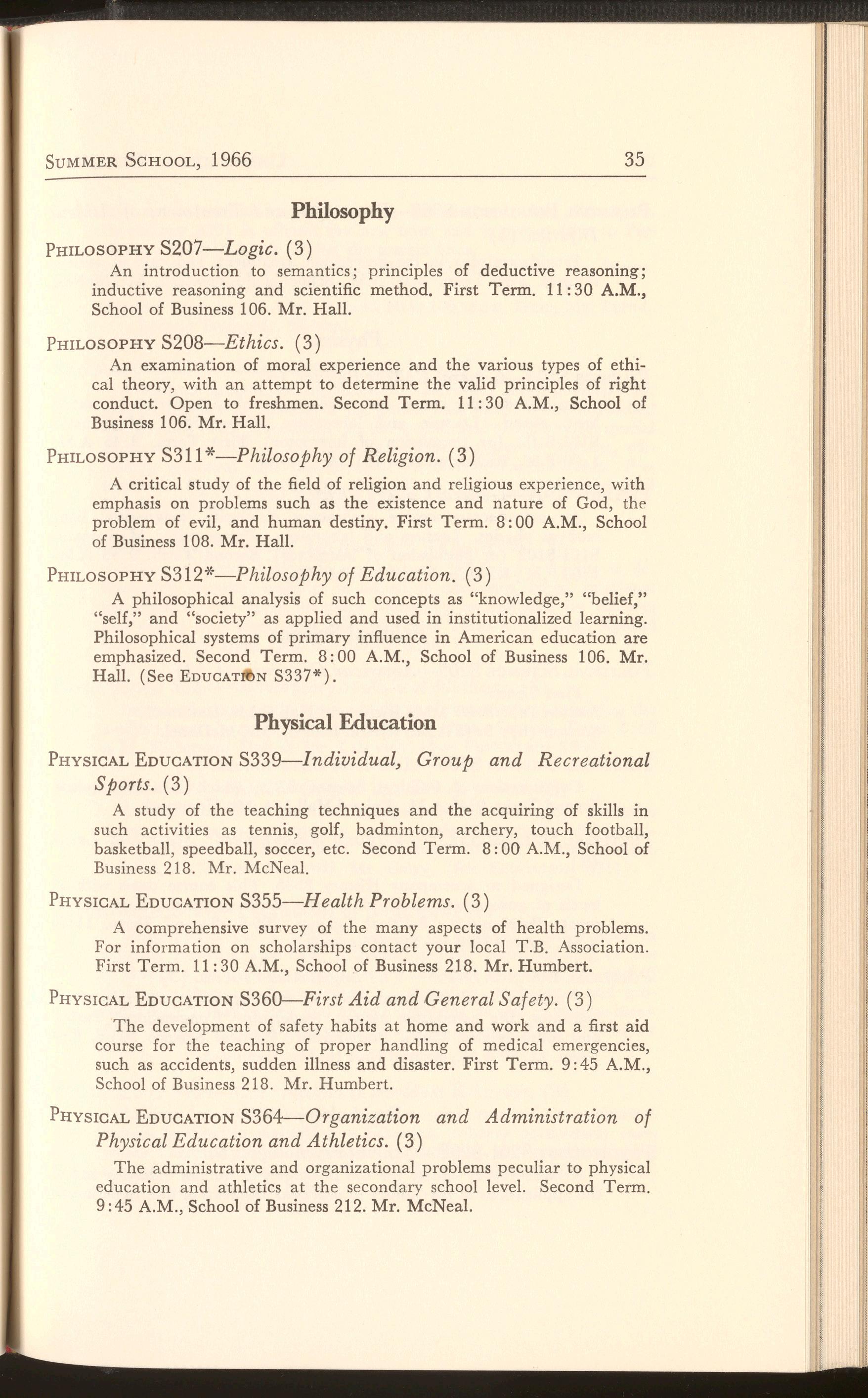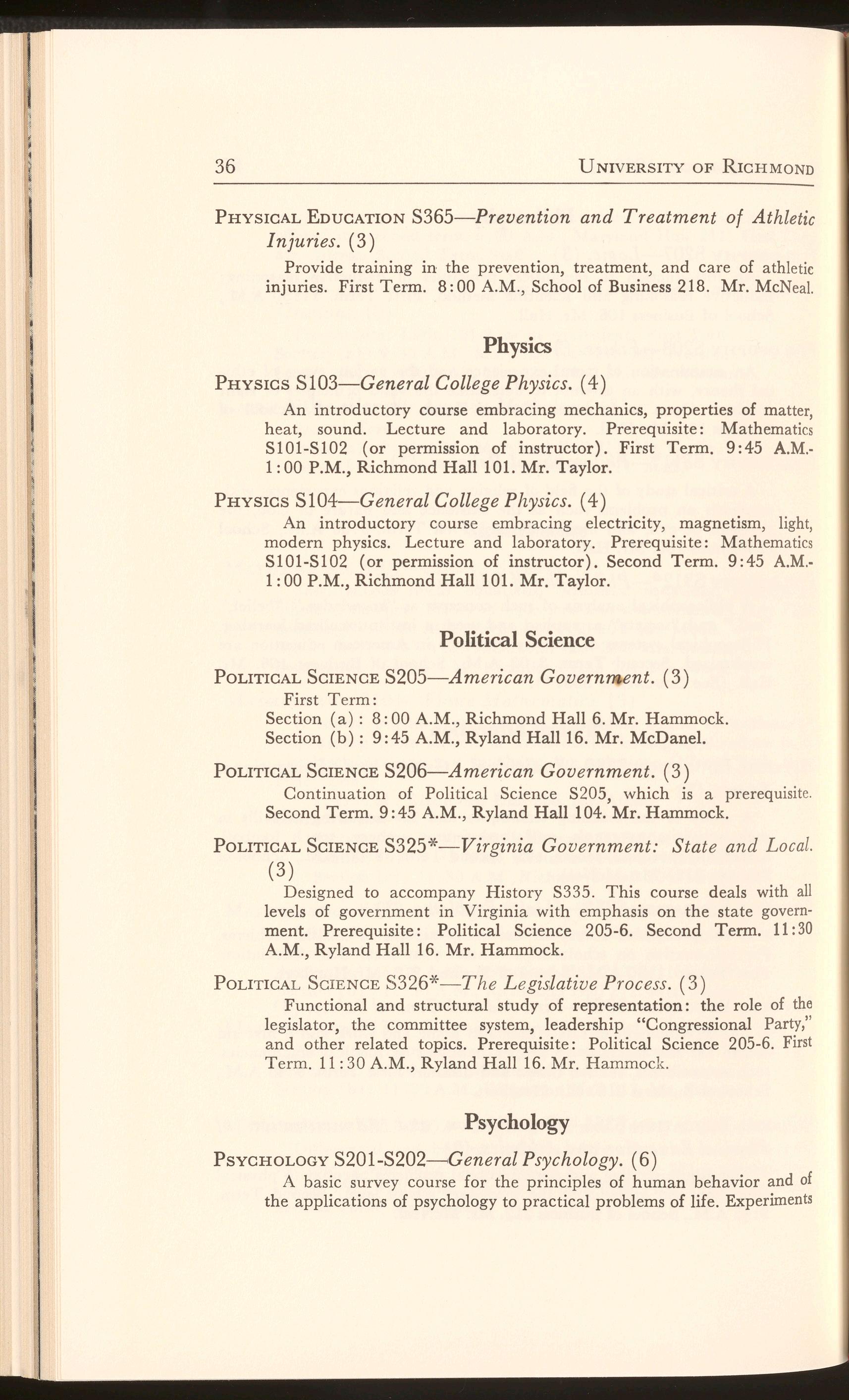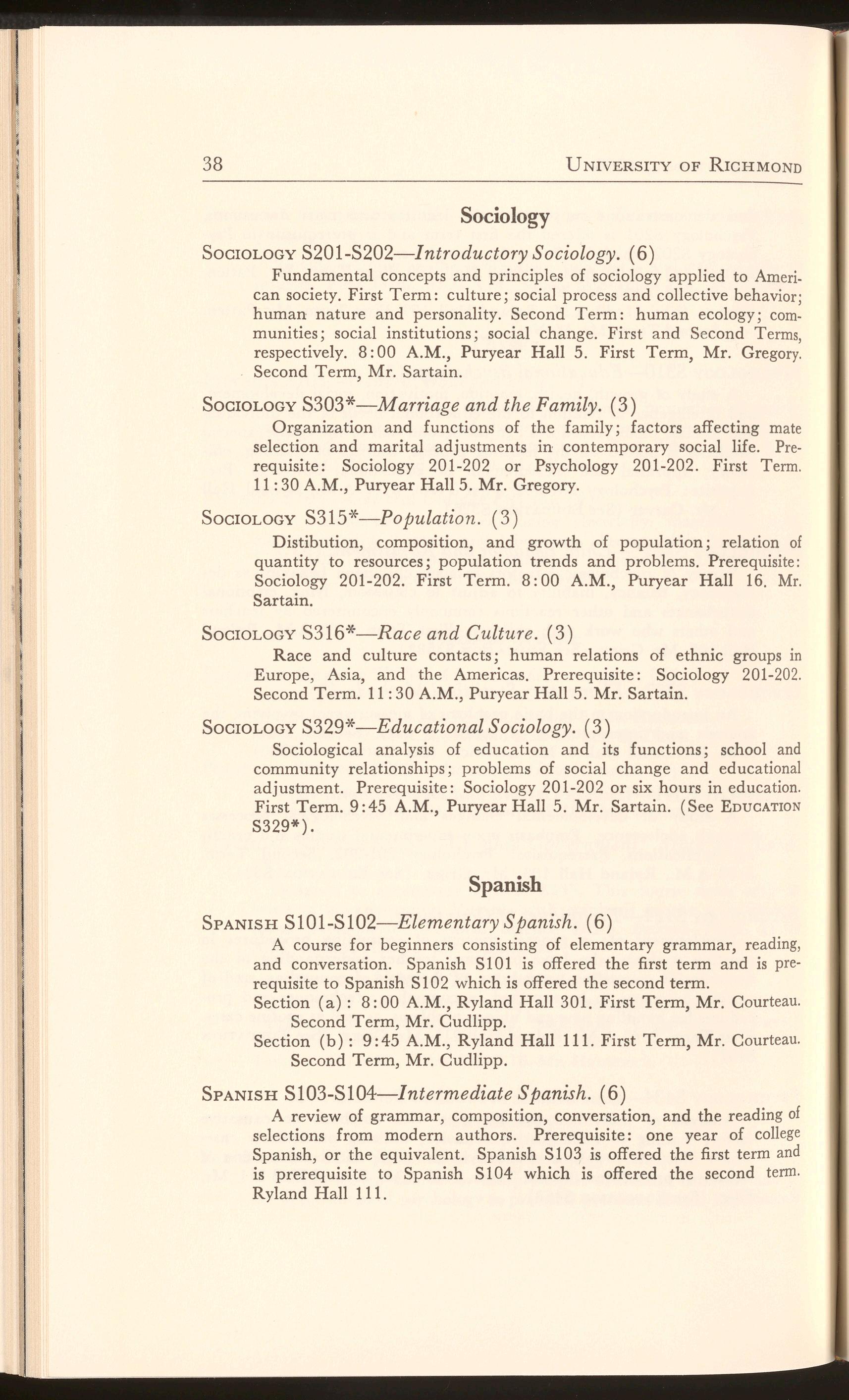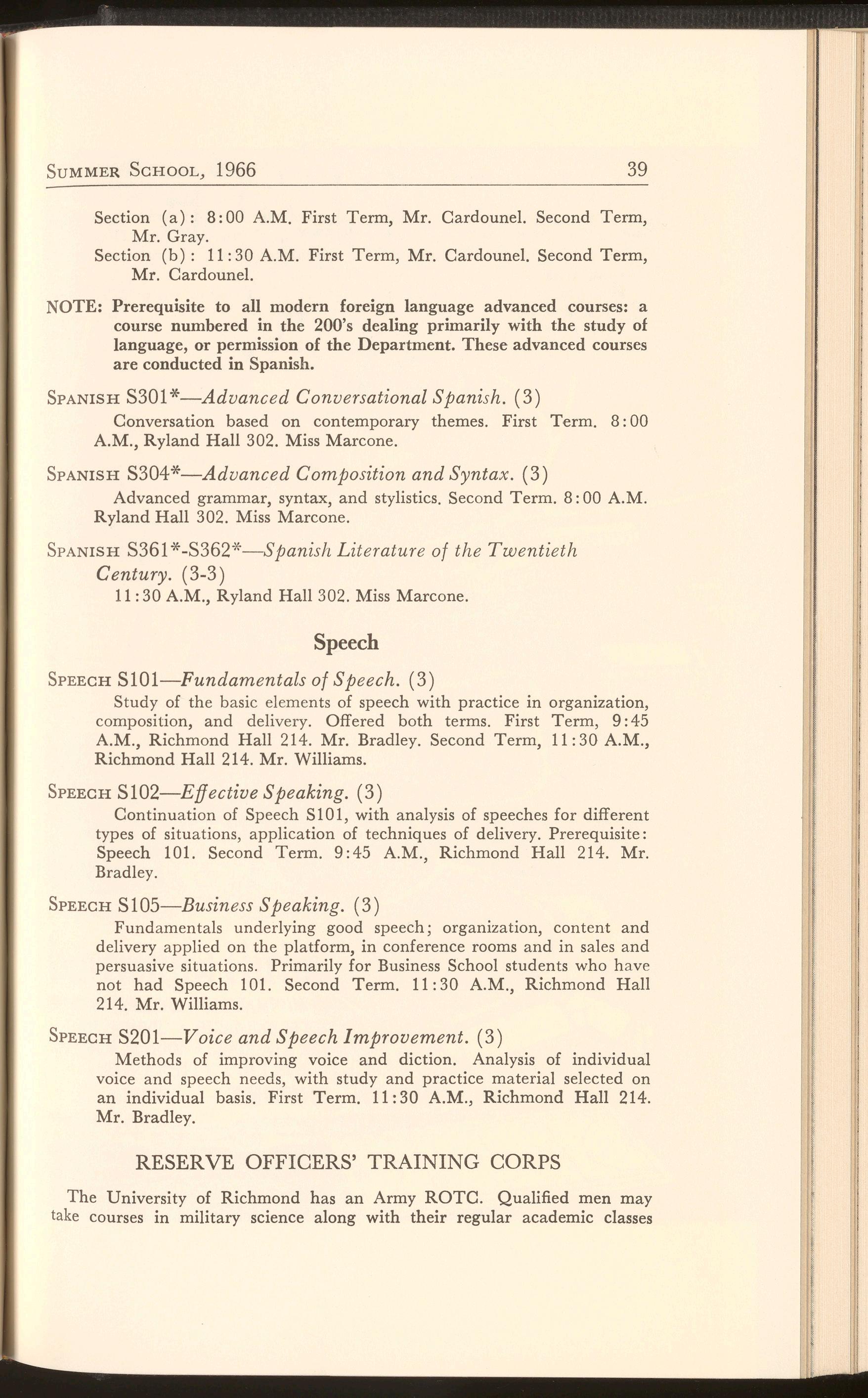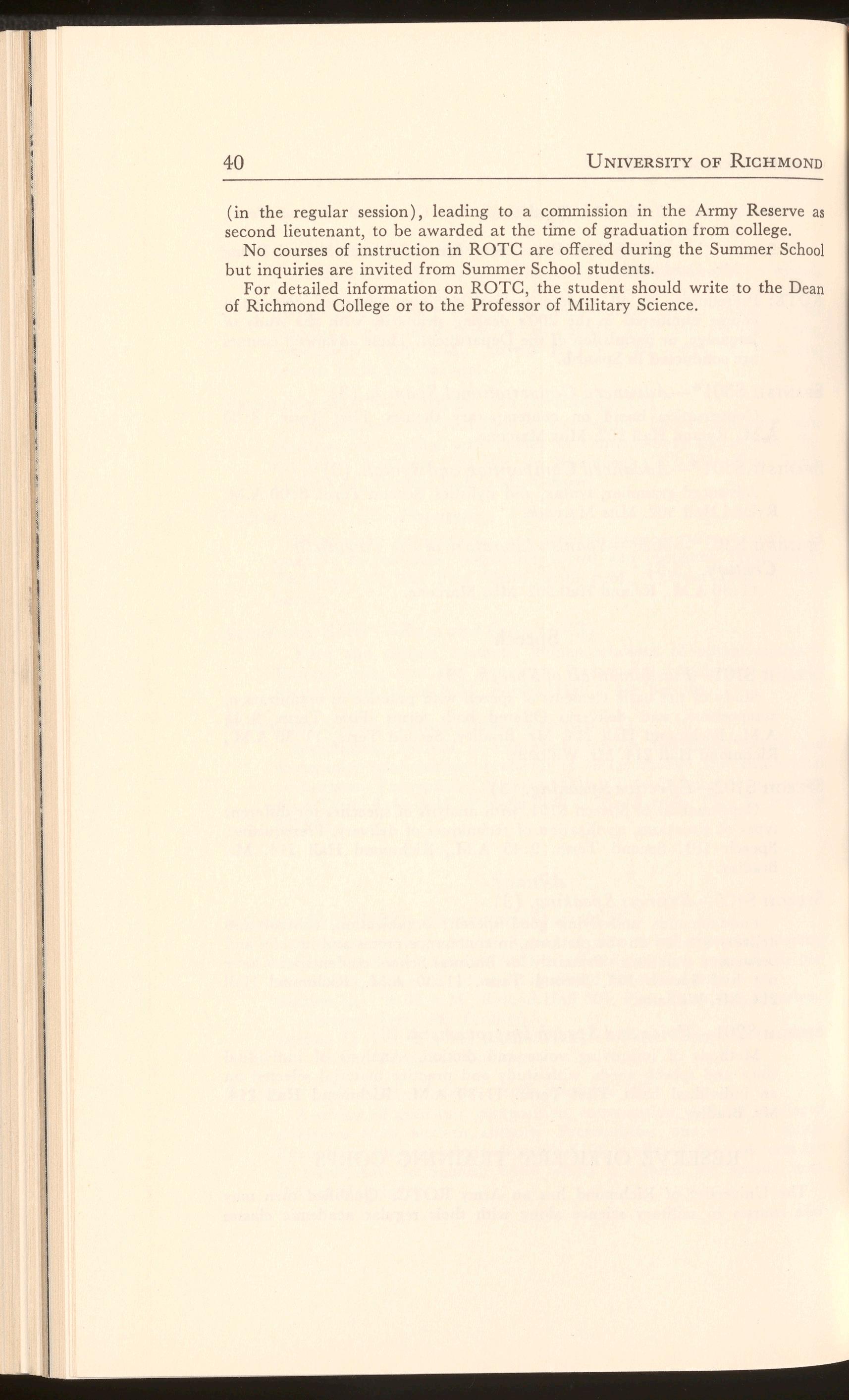Summer School Catalogue
ELEVEN-WEEK
June 13 to August 25
First Term: June 13-July 19
Second Term: July 20-August 25
UNIVERSITY of RICHMOND VIRGINIA
1966
Term
!st Term 2nd Term
Sub-total
CALENDAR-1966
JuNE 13, MONDAY-Registration in Millhiser Gymnasium, 8:00 A.M.-11 :30 A.M. and 1 :00 P.M.-2:OO P M
JuNE 14, TUESDAY-Classes begin at 8:00 A.M.
JuNE 15, WEDNESDAY-Last day to make any change in classes. ( Late fee: $10.00). Applications for degrees filed with Registrar.
JuNE 18, SATURDAY-Classes meet to make up registration da y
JULY 4, MoNDAY-Mid-term break. No classes.
JULY 18 AND 19, MONDAYANDTUESDAY-First-term examinations.
JULY 19, TUESDAY-First term ends.
JULY 20, WEDNESDAY-Registration and changes in classes for second term , Millhi ser Gymnasium, 1: 00-3: 30 P.M.
JULY 21, THURSDAY-Classes begin at 8: 00 A.M.
JULY 22, FRIDAY-Last day for changes in classes. (Late fee: $10.00)
AUGUST1, MONDAY-Last day for submitting bound copies of theses by applicants for Masters' degrees in August.
AUGUST 22 AND 23, MONDAYAND TUESDAY-Examinations for degree candidates .
AUGUST24 AND25, WEDNESDAYANDTHURSDAY-Second-term examinations.
AUGUST25, THURSDAY-Commencement, 7:30 P.M .
1965 SUMMER SCHOOL ENROLLMENT
ADMINISTRATIVE OFFICERS
GEORGE MATTHEWS MODLIN, PH.D., LL.D. President
CHARLES H. WHEELER, III, PH.D., D. Sc. Treasurer
EDWARD FRANKLIN OVERTON, PH.D. Dean
CLARENCE J. GRAY, M.A., ED.D. Dean of Students
JosEPHINE NUNNALLY, M.A. in L.S. Acting Librarian
THOMAS NICHOLAS POLLARD, JR., M.A. Registrar
FACULTY OF INSTRUCTION
GENE L. ADREAN, DR. IN LETT ....... Assistant Professor of Ancient Languages
ROBERT S. ALLEY, PH.D ................. Assistant Professor of Bible and Religion
H. PEARCE ATKINS, PH.D .............................Profes.sor of Mathematics
LEwrs F. BALL, PH.D .............................................Professor of English
JANE J. BARTHELMESS, M.A ................................ .Visiting Lecturer in Ancient Languages
CLINE D. BARTON, M.A. .... .. ...................... ......... .Instructor in History
ROBERT H. BELL, B.S ....................................... lnstructor in Chemistry
THOMAS S. BERRY, PH.D ...................Associate Professor of Economics
KENNETH A. BLICK, PH.D ... Visiting Lecturer in Psychology Associate Professor of Psychology, Randolph-Macon College
A.E. BRADLEY, JR., PH.D .......................Associate Professor of Speech
4
UNIVERSITY OF RICH MOND
JOHN W. BRIZENDINE, PH.n A ssistant Prof essor of Bible
IRBY B. BROWN, M.A .... ......... .. ................. ......Instructor in E nglish
HUMBERTO I. CARDOUNEL, PH.D A ssist an t Pr of essor of S panish
MERTON E CARVER, PH.D ......................Prof essor of Psy chology
ZADA D CARVER, M.A ............ ........ ..... Vi siting L ectur er in Edu cation H ead Coun selor, John Mar shall Hi g h School
RICHARD C . CHEWNING, D.B .A. .. .... A ssistant Pr of essor of Finance
RICHARD CouRTEAU, M.A .. Visiting L ectur er in Spanish
WILLIAM S. CuDLIPP , III , M .A .... .Visiting L ec tur er in S panish
FRED B. DIXON, ED.D .. . ... Vi siting L ectur er in Ed ucation Prin cipal , John Marshall High School
WILLIAM A. DORSEY, B.S . Visiting L ecture r in Biology Ch ief, Ri chm on d Public Health Labor atories
RICHARD B. EATON, M.A .................... .. ............. ..ln strucf}or in English
ROBERT J. FILER, PH.D ...... Professor of Psychology
FERNAND FISEL, PH.D Vi siting L ectur er in Modern Lan guages A ss,ociat e Prof essor, Ind iana Stat e Un iversity
E ELWOOD FORD, LL.B. , C.P. A A ssociat e Prof essor of Acc ounting
E. SHERMAN GRABL E , M .A. . A ssociat e Prof essor of Math ematics
E. W. GREGORY , JR. , PH .D ................ Prof essor of So ciology
AusTIN E. GRIGG , PH .D ............. Professor of Psychology
WILLIAM B. GUTHRIE, PH .D A ssociat e Prof essor of E nglish
JAMES H. HALL, JR. , PH.D Asso ciate Prof essor of Philosophy
ALLAN S. HAMMOCK , M . A . . .... . .. Visiting Lecturer in Political S cience
PHILIP R. HART, PH.D ................. Associate Prof essor of Bible and R eligious Edu cation
NATHANIEL H. HENRY, PH D .. Associate Professor of English
RICHARD E. HUMBERT , ED.D...............................A ssociate Prof essor of Physical Ed ucation
IVER P. IVERSON, M.A ......... . ..lnstructor in Ancient Languages
SUMMER SCHOOL, 1966 5
RoBISON B. JAMES, PH.D Assistant Professor of Bible and Religion
GEORGE W. JENNINGS, PH.D Associate Professor of Economics
PATRICK S. KEMP, C.P.A., PH.D .....Associate Professor of Accounting
FRANCIS B. KEY, M.A ................... Assistant Professor of Mathematics
FRANCIS B. LEFTWICH, PH.D. ................Assistant Professor of Biology
WrLI ,IAM H. LEFTWICH, PH.D Associate Professor of Psychology
RosE MARIE MARCONE, PH.D .............................Assistant Professor of Spanish and Italian
MARY J. MARKHAM, M.A Visiting Lecturer in English
W. M. MARR, JR., PH.D .......................Associate Professor of German
HUGHES Y. R. MATHIEU, BACCALAUREAT 1nstructor in French
GEORGE 0. McCLARY, M.S ..................... Supervisor of Guidance and Psychological Services, Richmond Public Schools
RALPH C. McDANEL, PH.D., LL.D ...................William Binford Vest Professor of History
E. MILTON McDONALD, B.A. Instructor in English
LEONARD D. McNEAL, M.A Assistant Professor of Physical Education
JAMES A. MoNcuRE, PH.D. ....................Associate Professor of History Assoc. Dean of Liberal Arts, University College
CLARENCE MoNK, PH.D ...............Associate Professor of Mathematics
HELE N A. MoNSELL, M.A., LITT.D .....Visiting L ecturer in Education Former Registrar, Richmond College, Author of children's books
JERRY D. MORTON, M.A ....................................... lnstructor in English
FREDERICK C. NEUMANN, PH.D ...............................Professor of Music
CATHERINE A. PASTUHOVA, PH.D Visiting Lecturer in Modern Languages
RICHARD L. PATTEN, M.A .............................. 1nstructor in Psychology
EowARD C. PEPLE, PH.D .......................................Professor of English Dean of the Graduate School
UNIVERSITY OF RICHMOND
CALVIN H. PHIPPINS, PH.D. Visiting Lecturer in Education
J. STANTON PIERCE, PH.D., D.Sc ..................... Professor of Chemistry
W. ALLAN PowELL, PH.D Associate Professor of Chemistry
WILLIE M. REAMS, JR. PH.D Associate Professor of Biology
NoLAN E. RICE, PH.D .............................................Professor of Biology
JAMES A. SARTAIN, M.A ..................... Assistant Professor of Sociology
GERALD C. SCHAEFER, M.S .................................. .lnstructor in Biology
SAMUEL T. ScHROETTER, JR., A.B .lnstructor in History
TALBOT R. SELBY, PH.D .....................Professor of Ancien~ Languages
N. WILFORD SKINNER, M.A. .. ............. Assistant Professor of German
SLADE W. SKIPPER, M.A ............................. lnstructor in Mathematics
HELEN LomsE SMITH, M.A Assistant Professor of Education
CLARENCE H. SPAIN, M.A ..................... Visiting Lecturer in Education
SAMUEL W. STEVENSON, PH.D Professor of English
MARION J. STOKES, M.A ........ .......Assistant Professor of Mathematics
JACKSON J. TAYLOR, M.S Associate Professor of Physics
WILTON R. TENNEY, PH.D ...................Associate Professor of Biology
HALEY F. THOMAS, M.A lnstructor in Modern Langua ges
HERMAN P. THOMAS, PH.D .............................Prof essor of Economics
WILLIAM E. TROUT, JR., PH.D Professor of Chemistry
HARRY M. WARD, PH.D .........................Associate Professor of History
RussELL G. WARREN, B.S. IN B.A ................. lnstructor in Economics
WARWICK R. WEST, JR., PH.D .............Associate Professor of Biology
R. BARRY WESTIN, M.A. ..................................... .lnstructor in History
DAVID MEADE WHITE, LL.B Visiting Lecturer in Business Law
ALTON WILLIAMS, M.A ....................................... Associate Professor of Speech and Dramatic Arts
GENERAL INFORMATION
Organization
Established in 1920, the Summer School became the fourth division in the University of Richmond. The first of the seven divisions of the University of Richmond was Richmond College, founded in 1830 as a college of liberal arts and sciences for men. The remaining divisions are the T. C. Williams School of Law ( 1870); Westhampton College, a college of liberal arts and sciences for women ( 1914); the Graduate School (1921); the School of Business Administration ( 1949) ; and University College ( 1962) . Each school has its own dean, its own faculty, and its own institutional life. The University Senate, on which sit representatives of all the faculties, provides for intercollegiate cooperation.
T he legal name of the corporation is University of Richmond. It was found ed by and is affiliate d with the Baptists of Virginia. The Board of Trustees of the University of Richmond controls all endowment and other funds and makes all appropriations. The several colleges award no degrees, but all degrees for work done in any one of the colleges are conferred by the University of Richmond. Ultimate authority is vested in the Board of Trustees and the Presid ent of the University.
The University of Richmond, one of the twenty-four affiliated inst itutions of the University Center in Virginia, benefits from the several co-operative programs of the Center.
Grounds and Buildings
T he campus of the University of Richmond, often referred to as one of the most beautiful natural college campuses in the United States, cont a ins three hundred and fifty acres of law n s and woodlands. It is situated on the hills abov e the histori c J ame s River, about six m iles west of downtown Richmond and may b e r eached by buses op erating on fr equent schedules.
All permanent buildings are of substantial fireproof construction, and everywhere att ention has been paid to safety , he a lth , a nd comfort in surroundin gs of striking landscape and architectural b ea uty.
T h e Summer Sch ool is usually conducted in the buildings of Richmond College, the office of the Dean of th e Summer School being located on the ground floor of Robert Ryland Hall . The Uni-
versity Administrative offices of the President and Treasurer are located on the ground floor (lake side) of the Boatwright Library The science departments are in Puryear Hall (chemistry), Richmond Hall (physics and mathematics), and Maryland Hall (biology) The School of Business Administration and the T. C. Williams School of Law occupy their respective buildings on the main campus . The downtown campus of University College is located on Lomb ardy Street between Grace and Broad Streets.
Library Facilities
The librari es of the Uni v ersity cont a in ov er 168,000 volu mes. The main collection is housed in the imposing Frederic William Boatwright Memorial Library. The central structure, provided by contributions of the Baptists of Virginia, is equipped with the most modern facilities for study and res earch. A wing of the buildi ng contains the valuable collection of the Virginia Baptist His t orical Society. In addition to the main collection there are division and departmental collections housed in other buildings on the campus, such as: law, business, biology and chemistry.
The University collections are classified by the Dewe y D ecimal System, and the students have direct access to the shelves. Instru ction in the use of the Library is given to all freshmen.
The collections in the Richmond Public Library, Virginia State Library , M edical Coll ege of Virginia Library, the Virginia Inst itute for Scienti fic R esearch Library, and th e Vir ginia Histori cal Society Library afford exceptional additional facilities for research.
Scope of Offering
Courses are offered to meet the needs of the following:
1. Qualifi ed hi gh school stud ents wishing to begin their college studies before the fall term.
2. Regular college students, as well as those working on an accelerated program.
3. Pre-professional stud ents desiring to meet entrance requir ements of medical, law, and other professional and techni cal schools.
4. Students in the T. C. Williams School of Law.
5. Students in the School of Business Administration
6. Teachers wishing to obtain credit toward degrees or certificat es,
SCHOOL, 1966 9
or to renew certificates. Basic courses in biology, chemistry, and physics, and advanced courses in biology and chemistry afford an opportunity for teachers who wish to broaden their field of teaching in science as well as take advanced work in science. 7. Graduate students desiring work leading to the degrees of Master of Arts, Master of Science, and Master of Science in Education.
Length of Session
The 1966 Summer Session will extend through a period of almost eleven weeks. In the first term of five and one-half weeks, from June 13 through July 19, classes will meet daily Monday through Friday. Classes will meet one Saturday (June 18) to make up registration day. In the second term of five and one-half weeks, beginning July 20, classes will meet daily Monday through Friday. The length of the class periods will be ninety minutes net time. This program will enab le one to earn a semester's credit in each course taken for either term.
The Honor System
One of the outstanding traditions of the University of Richmond is the concept of honor held by the students in its several colleges. The Honor System requires that a person shall in all relations of student life act honorably. The essence of the Honor System is that a student's word as a member of the Summer School can be accepted without question as the truth and that any violation of a student's word is an offense against the entire student body. Breaches of the Honor Code include cheating, violation of a signed pledge, lying, stealing, failure to report one's own or witnessed violations of the Honor Code, failure to appear before the Honor Council when summoned, and, in general, breaking one's word of honor in any circumstances.
When a student matriculates for either term of the Summer School, he is given an explanation of the Honor Code, by which he must agree to abide before he can finally complete his matriculation.
University Center for Psychological Services
The University Center for Psychological Services will be in operation during both semesters of the summer session. The Center will provide testing and counseling services and work in reading improveme nt for students of the Summer School. No special fees will
Ibe charged for such services to full-time Summer School students. Center services are provided also on a special fee basis to individuals not enrolled in the Summer School.
Post Office and Telegraph Addr~
The post office address is University of Richmond, Virginia 23173 The telegraph address is Richmond, Virginia.
ADMINISTRATION
Requirements for Admission
For admission to the summer session, the applicant must be at least sixteen years of age, and the graduate of an accredited secondary school, except that students twenty-one years of age and over, who are not graduates of accredited secondary schools, but who meet other qualifications, may enter as Special Students, but not as candidates for degrees.
All applicants who have not previously been enrolled in the University of Richmond must present their entrance credentials.
Students planning to enter Summer School directly after graduating from high school must submit transcript of high school work, including scores on the Scholastic Aptitude Test of the College Entrance Examination Board, unless this information has been sent previously to Richmond College or Westhampton College. For information concerning test dates and testing centers for the College Entrance Examination Board, the candidate should inquire of his high school counselor or principal, or write to the Educational Testing Service, Box 592, Princeton, New Jersey.
Those applying for admission from accredited colleges or universities need not send a complete transcript of their college work unless they also wish to apply for admission to some other division of the University of Richmond. For admission to the Summer School only. the applicant must present on a form which will be sent with the application blank a statement from the dean or registrar of the institution in which he is currently enrolled to the effect that he is in good standing and that his proposed summer courses are approved. If a student's status changes after this statement is issued, his admis-
sion to the Summer School is governed accordingly. A student who wishes to remove a scholastic deficiency must be certified as eligible to return to his college in September, 1966, upon successful completion of his Summer School work.
All applications, together with other necessary papers, such as transcripts or certification of standing statements, should be received in the Summer School office not later than one week prior to the opening of Summer School. Of course, the earlier an application is cleare d, the greater are the applicant's chances of getting the classes he desires.
Special Opportunity for High School Students
Beginning with the 1966 session, the University will admit qualified high scho·ol students who will have completed the work of the junior year by the close of the current session.
The Summer School affords to those accepted an opportunity to enrich their academic background by participating in college level courses for full credit. It also introduces the student to the stimulating college community, and presents an academic challenge to the ambitious student.
All freshman level courses are open to those high school students whose scholastic achievement and aptitude clearly indicate preparedn ess for such work. Students will enroll as full time summer school stud ents subject to all rules and regulations of the University of Ric hmond Summer School. Credit earned in this program will be kept on file to be applied to the student's degree program if he is accept ed to Richmond College or Westhampton College upon graduation from hi gh school, or a transcript will be forwarded to another college if requested by the student. Of cour se, whether another college accepts this work is not for the University of Richmond to guarantee. It is a lw ays th e receiving institution which has the right to evaluate any cre dits pres ented to it. The credits are not transferable to a secondary school.
Special admission requirements for students in this experimental program include the following: ( 1) rank in the top fifth of the junior class; ( 2) aptitude and achiev ement test scores that clearly indicate capacity for college level study; ( 3) evidence of interest and determina tion to meet the challen ge of college level work; and ( 4) recommend a tion of the high school principal ( or headmaster) or guidance coun selor . The Summer School cannot guarantee consideration of any applica tion for this special program rec eived after May 15, 1966.
Application Procedure
High school juniors should request their high school to send transcript of their high school work through the first semester ·of their junior year, together with appropriate test data. A supplementary transcript showing the work of the final semester of their junior year should be forwarded as soon as possible prior to June 13.
High school graduates should request their high school to send transcript of their high school work through the first semester of their senior year, together with College Board scores and other test data. A supplementary transcript showing the work of their final semester of high school and the date of their graduation should be forwarded prior to June 13.
Applicants from accredited colleges must have their dean or registrar send a Certificate of Standing form in lieu of a transcript.
H alders of a Bachelor's degree must have transcript of all college work undertaken sent to the Dean of the Graduate School regardless of whether they intend to take work for graduate or undergraduate credit.
All applicants: An application fee of $10.00, which is not refundable must accompany every application for admission. If the applicant is accepted and matriculates, this $10.00 fee is applied to the matriculation fee.
Matriculation
Students who have been accepted for admission register for either term or for both terms Monday, June 13, from 8:00 A.M. , to 11: 30 A.M., and from 1: 00 P.M. to 2: 00 P.M. Students attending the second term only will register on Wednesday, July 20, from 1: 00 P.M. to 3: 30 P.M. if they did not register previously on June 13. Regular class work will begin at 8: 00 A.M. Tuesday, June 14, for the first term and Thursday, July 21, for the second term. Class absences count from the first day.
After registration has been completed, no student is permitted to change from one course to another or from one section of a class to another without the approval of the Dean. No such change will be permitted for the first term after Wednesday, June 15, or for the second term after Friday, July 22. The fee for changing classes or sections is $10.00. No change from credit to audit or .from audit to credit can be made after the second day of classes.
No matriculations will be accepted for a first-term class after 2:00 P.M., Tuesday, June 14 or for a second term class after 3:30 P.M. Thursday, July 21. Students who fail to complete matricula-
tion for the first term by 2: 30 P.M. June 13, in Millhiser Gymnasium or by 4:00 P.M. the same day through the Treasurer's office will have to pay a late matriculation fee of $10.00. Late registrants for the second term are also subject to the $10.00 late matriculation fee. In matriculating students, the right is reserved to require the immediate withdrawal of any student from the Summer School whenever the administration decides that such action is desirable.
Absences
Due to the short terms no absences from classes or laboratory periods are allowed except for emergencies. Such emergencies will be considered individually by the Dean or the Dean of Students.
Grading
The achievement of students in class work and in examinations is indicated as follows: The letter A indicates that the work has been excellent (95-100); B, that it has been very good (88-94); C, that it has been average (80-87) ; D, that it has been just passing (75-79). Grades "E," "F," and "I" are failing grades. The grade of "E" may be raised to a passing grade of "D" by such method as the professor may indicate in writing to the Registrar, but it automatically becomes an "F" unless it is successfully removed within twelve months or before the course on which it was incurred is offered again. The grade of "I" may be removed upon satisfactory completion of the incomplete work. The final grade of "I" ( Incomplete) shall become a final grade of "F" within one week after the official close of the term in which the grade was incurred. The only exceptions shall be those approved by the Dean upon request if the instructor designates a specified period of time for the removal of the grade of "I." Where the grade is "F," the course must be repeated and passed if the student is to obtain credit. If a student withdraws from the Summer School or drops a class after the third class day of the term, a grade of "M" (Withdrew-Failing) will be recorded unless in the judgment of the Dean or Dean of Students and the professor concerned the grade should be recorded as "W" (Withdrew-Passing) or "W" (Withdrew).
Special examinations on work in the summer session may be taken on September 13, 1966. Applications for such special examinations must be made, in writing, to the Registrar's office at least two weeks before the examination date. Each application must be accompanied by the Treasurer's receipt for the special examination fee of two dollars.
Limits of Work
The normal amount of work which a student may take is two 3-semester hour courses ( or one 3-semester hour course and one 4-semester hour laboratory science) each term. Students who wish to take more than this amount of work must include with their request a written recommendation from the dean ( or other appropriate official) of the college or university to which credits are to be sent. Final approval rests with the Dean of the Summer School. Much time will be saved if the student has his statement in hand at the time of application for admission. Permission to carry more than 7 semester hours will not be considered unless the student meets one of these two conditions: ( 1) he must be a candidate for a degree at the close of the current session of the Summer School and must need the extra course to meet degree requirements; or ( 2) he must have a grade average of at least "B" ( 88 or above) on a normal load of work undertaken in the semester immediately preceding the term in which he wishes to carry more than 7 semester hours. In no case will permission be given to carry three courses in one term if one of the courses is a laboratory science.
Veterans attending the Summer School under Public Law 550, 634, or 894 must carry two three-semester-hour courses per term in order to be eligible for full subsistence. These courses which the veteran takes must be acceptable for satisfying degree requirements.
Minimum Class Size
The right is reserved not to organize any class unless there are as many as ten applicants ( 15 in a laboratory science) . The right is also reserved to modify or withdraw any class, or to change instructors.
UNDERGRADUATE DEGREES
The following baccalaureate degrees are offered by the Universit y of Richmond through its Summer School: B.A., B.S., and B.S. in Business Administration.
A candidate for any of these degrees must be a graduate of an accredited secondary school.* His last four years of high-school work must include a minimum of sixteen acceptable units, distributed as
*An acceptable score on the Virginia State Board of Education High School Completion Examination or the General Educational Development Tests, High School Level, may be considered in lieu of high school graduation. The specific requirements in mathematics and language listed above, however, must still be met.
SUMMER SCHOOL, 1966 15
follows: English-4; mathematics-3, including 2 in algebra* and 1 in geometry; history-1 ; foreign languag~2; science-1. The remaining units are elective from high school graduation requirements except that not more than four units of vocational work will be accepted and no credit will be allowed for less than two units in any foreign language. A student who enters college without two units in foreign language will be required to take in college without degree credit a first-year foreign language to remove his deficiency. The academic requirements for the several degrees are stated in semester hours. Quality credits are calculated from academic hours on the following basis: a semester hour passed with grade A shall count three quality credits; with grade B, two quality credits; with grade C, one quality credit; with grade D, no quality credit.
B.A. and B.S.-During the second semester of his sophomore year, a student must select a field of concentration which will include not less than twenty-four hours in one department and courses in related subjects to bring his total in the field of concentration to a minimum of forty-two semester hours. His program of studies in this field must be made out under the guidance of the chairman of the department in which he wishes to concentrate, and be filed in the Registrar's office. In the majority of cases, the field of concentration will consist of twenty-four hours in one department and eighteen hours in related subjects approved by the chairman of the department. In the laboratory sciences, these will be from thirty to thirty-three and twenty semester hours respectively. For the B.S. degree the whole field of concentration will be chosen from the laboratory sciences and mathematics.
B.S. in Business Administration-Students who wish to enter the School of Business Administration as full-time students must have completed sixty semester hours and must have earned a minimum of a true "C" average on total hours attempted. In selecting applicants for admission, the School of Business Administration is interested in men and women with well-rounded liberal arts backgrounds who have given evidence of earnestness of purpose and have demonstrated leadership qualities.
At least sixty semester hours of approved junior and senior courses, including all those taken during the senior year, must be passed with credit at the University of Richmond; and at least forty-five of these sixty semester hours must be selected from the curriculum offered by the School of Business Administration. For a detailed explanation of this degree, consult the catalogue of the School of Business Administration.
* One of these units may have been completed in the 8th gradt.
DEGREE REQUIREMENTS
A candidate for a degree must offer at least 124 semester hours of work, including not less than 120 hours of academic work. He must earn at least as many quality credits as the total number of semester hours of academic work taken during his college career.
Bachelor of Arts
I. REQUIRED COURSES
ENGLISH 101-102, 203-204
MATHEMATICS One of the following combinations: 101-104; 151-104; 151-152; or 251-252
(A student, however, by passing a special examination on high-school plane geometry and algebra through quadratics, may thereby satisfy the mathematics requirements for the B.A. degree. Mathematics 151-152, however, is a prerequisite for all advanced science courses.)
FOREIGNLANGUAGES:The second year in each of two foreign languages
NATURALSCIENCES (Biology, Chemistry, Physics): The first year in two of the above sciences (A student who offers one of the Mathematics combinations above may satisfy the natural sciences requirement by offering eight semester hours in only one natural science.)
BIBLE 203 and 207 or 307 ...
OTHER SocIAL SCIENCES. Six hours in each of two of the following: (Economics 201-202, Education, Philosophy, Politi-
cal Science 205-206, Psychology 201-202, Sociology 201-202)
III. ELECTIVE COURSES
Bachelor of Science
I. REQUIRED COURSES
ENGLISH 101-102, 203-204
FOREIGNLANGUAGES:The second year in each of two foreign languages or two years in one foreign language above course 101-102
SUMMER SCHOOL, 1966
NATURAL SCIENCES (Biology, Chemistry, Physics): The first year in two of the above sciences
BIBLE 203 and 207 or 307 ...
HISTORY 107-108 .
OTHER SOCIAL SCIENCES. Six hours in one of these social sciences: (Economics 201-202, Education, Philosophy, Political Science 205-206, Psychology 201-202, Sociology 201-202)
BIOLOGY 109-110 .
EXPENSES
Fees
Matriculation fee (for one or both terms)............ . . $ 10.00
Tuition (each semester hour) undergraduate or graduate credit
Science laboratory fee ( each term)
Room and Board, each term.... 135.00
Board for non-resident students, each term.. 90.00
Bachelor's diploma fee (must be paid by Aug. 1) 5.00
Master's diploma and hood fee (must be paid by Aug. 1) 25.00
Late registration or change of class fee 10.00
Auditing ( attending without credit) per course...... 48.00
All charges are due at the time of registration. Checks should be made payable to University of Richmond.
Notes
A student is not fully matriculated for either term until satisfactory arrangements have been made with the Treasurer for the fees for that term and his full course of study and schedule of classes have been finally approved by the Dean's Office. Students who fail to complete matriculation for the first term by 4:00 P.M., Monday, June 13, 1966, or Wednesday, July 20, 1966, for the second term,
will be charged an extra fee of $10.00. For changing a class or section after matriculation is completed (except for administrative changes), a fee of $10.00 is charged.
Students are matriculated for a full term. In case of withdrawal for whatever cause, no refund of fees or any part of fees is made . In the event of withdrawal on account of student's sickness, proportionate deductions may be made in the charge for board.
A veteran attending under Public Law 894 should have his Certificate of Eligibility and Entitlement when he registers. If he does not have a valid certificate, he will be required to make a deposit which will be equivalent to his fees and the cost of books and supplies.
A veteran attending under Public Law 550 or Public Law 634 must present a Certificate of Education and Training. These veterans will be required to pay their fees in the same manner as non-veteran students.
Students must register at matriculation all motor vehicles used on the campus and must abide by regulations concerning the use and parking of such vehicles. Failure to register a motor vehicle or abide by the regulations will subject the student to penalties. These regulations are given to the student at the time of matriculation.
Graduate Scholarships
In the Summer School of 1966, the University offers ten Williams Graduate Scholarships of $100.00 each to qualified graduate students who have been accepted as candidates for the Master's degree. Application for these scholarships should be made to Dr. E. C. Peple, Chairman, Scholarship Committee, University of Richmond , Virginia, not later than April 30, 1966.
Room and Board
The University has ample provision for room and board for both men and women students. Although it does not provide apartments for married couples, the Dean's office maintains a list of apartments and rooms available off campus to Summer School students.
The College dormitories open for students Sunday afternoon , June 12, for the first term and Tuesday afternoon, July 19, for those who attend second term only. Students are advised not to arrive earlier than this date.
It is important that students who wish to live in the dormitories make early application for rooms. Rooms in dormitories will be
SUMMER SCHOOL, 1966 19
assigned in the order in which the complete application with deposit is received in the Dean's office. A deposit of twenty dollars must be made by each applicant in order to reserve a particular room. This fee will be refunded only if written notice releasing the room is received by the Dean before May 21, 1966. Checks should be made payable to University of Richmond and enclosed in the letter of application to the Dean. If a student occupies the room, the above deposit of twenty dollars is returnable after the close of the session, less any charges for damage to the building or its furniture not previously paid . A student will be billed promptly for any damages to the building or its furniture.
The dormitories and boarding department are conducted as a unit and assignments made by the term. Ordinarily no adjustment is made on account of withdrawal. In case of sickness, however, a refund may be made for board. Notice of withdrawal must be given in a dvance and approved by the Dean or Dean of Students and the Tr easurer before any adjustment is made .
T he college supplies students' rooms with bedstead , mattress, pillow, d r esser, study desk, chairs, and clothes closet. Each student provides his own bed furnishings and linens.
T he number and type of electric lamps and appliances in a room are to be limited , and in no instance may the total power rating exceed 650 watts in any room. Television sets are not permitted in dormitory rooms
I t is understood that a single occupant of any room intended for two students shall be responsible for the full rent of the room. No student is allowed to sublet his room , take another student in with him, or move from one room to another without permiss ion from the Dean or Dean of Students. A charge of five dollars is made for changing from one room to another aft er June 13, except that students are permitted, without paying this charge, to change rooms at the end of the first term, provided request for such change is filed with the D ean's office on or before July 9 of the current session. The charge will be enforced after the opening of the second term.
GRADUATE DEGREES
It is possible for a student who has a standard B.A. or B.S . degree to ta ke the degree of Master of Science in Education by work in the Summer School, provided his work as an undergraduate has been of such quality as to put him in the upper half of his class.
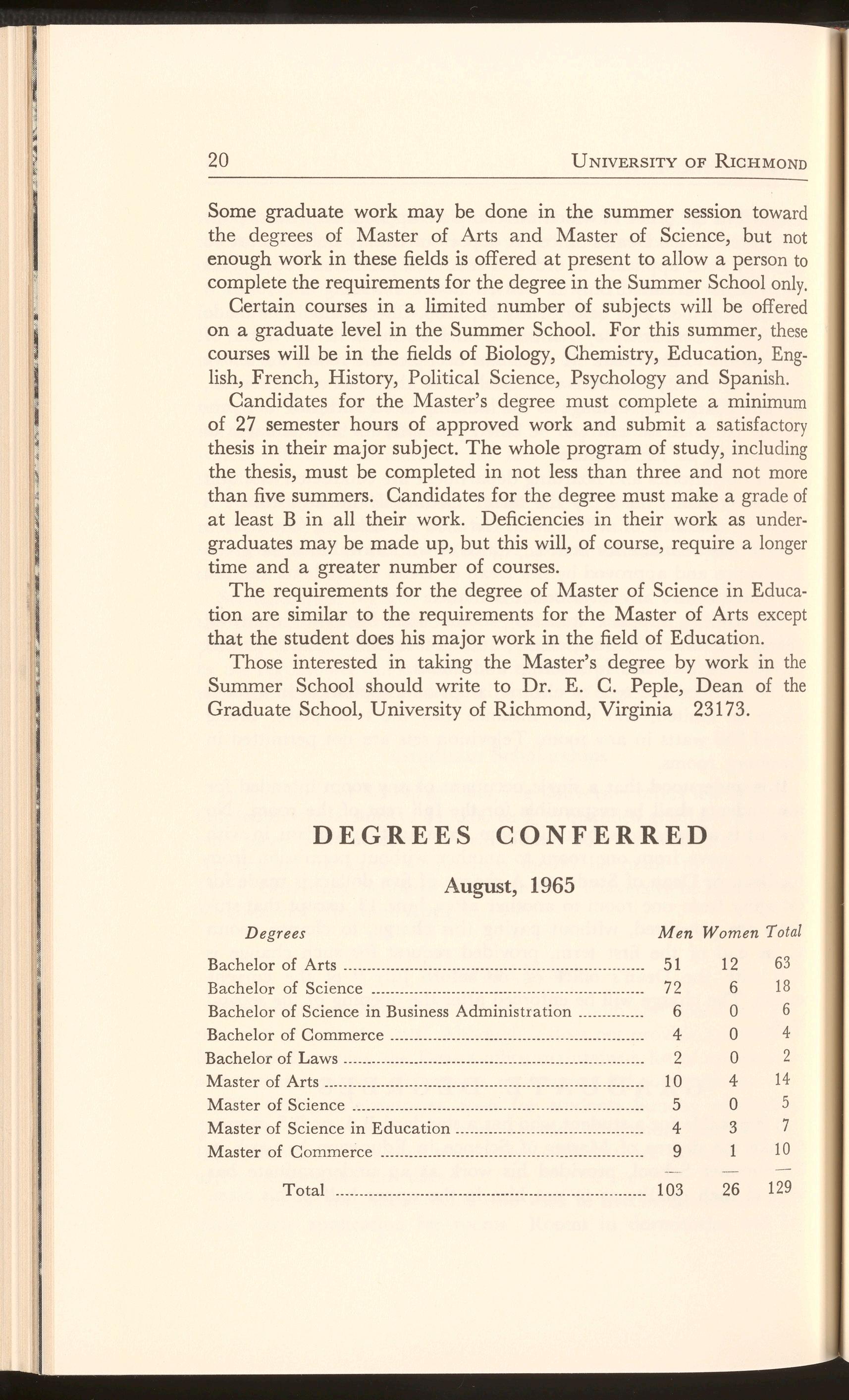
Some graduate work may be done in the summer session toward the degrees of Master of Arts and Master of Science, but not enough work in these fields is offered at present to allow a person to complete the requirements for the degree in the Summer School only. Certain courses in a limited number of subjects will be offered on a graduate level in the Summer School. For this summer, th ese courses will be in the fields of Biology, Chemistry, Education, English, French, History, Political Science, Psychology and Spanish. Candidates for the Master's degree must complete a minimum of 27 semester hours of approved work and submit a satisfacto ry thesis in their major subject. The whole program of study, inclu ding the thesis, must be completed in not less than three and not more than five summers. Candidates for the degree must make a grad e of at least B in all their work. Deficiencies in their work as undergraduates may be made up, but this will, of course, require a longer time and a greater number of courses.
The requirements for the degree of Master of Science in Edu cation are similar to the requirements for the Master of Arts except that the student does his major work in the field of Education. Those interested in taking the Master's degree by work in the Summer School should write to Dr. E. C. Peple, Dean of the Graduate School, University of Richmond, Virginia 23173.
SCHEDULE OF CLASSES
Course-First Term
Accounting S301
Bible S203(a)
Biology SlOl (a)
Biology Sl0l (b)
Business Administration S301
Chemistry Sl0l (C)
Chemistry S305C
Economics S201 (a)
Education S326
Education S358*
Education S545
Education S560
English Sl0l (a)
English S203(a)
English S331 *
French Sl0l (a)
German S103
Greek Sl0l
History S107 (a)
History S205(a)
History S335*
Latin Sl0l
Mathematics SlOl (a)
Mathematics S151(a)
Mathematics S251
Philosophy S311 *
8:00-9:30
SBA 210
Accounting S302
SBA 200 Bible S207
MH 102 Biology Sl02(a)
MH 202 Biology S 102 (b)
SBA 106
PH 108 Chemistry S 102 ( C)
PH 13 Chemistry S306C
SBA 212
SBA 108 Economics S202(a)
RyH 211
SBA 106 Education S337*
RyH 103 Education S341
RH 6 Education S380
SBA 212 Education S528
JMHS
RH 214
FB 101 English S102(a)
FB 102 English S204(a)
FB 103 English S301
FB 104 French Sl02(a)
RyH 110 German Sl04
MH 213 Greek S102
RyH 104 History Sl08(a)
RyH 15 History S206(a)
RyH 16 History S305*
MH 211 Latin Sl02
RH 204 Mathematics Sl04(a)
RH 212 Mathematics S 152 (a)
RH 206 Mathematics S252
SBA 106 Philosophy S312*
Physical Education S365 SBA 218 Physical Education S339
Political Science S205(a)
Psychology S201 (a)
Psychology S310
RH 6
RyH 109 Psychology S202(a)
Psychology S321 * RyH 103
Sociology S201
Sociology S315*
Spanish Sl0l (a)
Spanish S103(a)
Spanish S301 *
SBA 108 I
RyH211 I
RH 6
RyH 103
PH 5
PH 16
Psychology S337 I
Psychology S341 f
Sociology S202
RyH 301 Spanish Sl02(a)
RyH 111 Spanish Sl04(a)
RyH 302 Spanish S304*
Course-First Term
Accounting S303
Biology SlOl (a)
Biology SlOl (b)
Biology S210
Chemistry Sl 0lL
Chemistry S209C
Chemistry S 305L
Classics in English S301
Economics S317
Education S329*
Education S353
Education S467
Education S535
Room
UNIVERSITY OF RICHMOND
Course--Second Term 9:45-11 :15
SBA 210
MH 102
MH 202
MH 13
MH 4
PH 103
PH 16
PH 204
MH211
SBA 108
PH 5
RyH 109
RyH 211
RyH 103
Education S545 JMHS
English Sl0l (b)
English S203 (b)
English S313*
French S103(a)
French S301 *
German S 101
History S107(b)
History S205 (b)
Latin Sl03(a)
Mathematics Sl0l (b)
Mathematics S104
Physical Education S360
Physics S103
Political Science S205 ( b)
Psychology S424
Sociology S329*
Spanish Sl0l (b)
Speech Sl0l
Bible S203(b)
Bible S310*
Biology SlOl(c)t
Biology Sl0 ·l ( d) t
Biology S2 l 0
Chemistry S209L
Economics S201 (b)
FB 101
FB 102
FB 103
FB 104
RyH 302
RyH 110
RyH 104
RyH 15
RyH 15
RyH 16
MH 213
RH 204
RH 206
SBA 218
SBA 212
RH 101
RyH 16
RyH 104
Accounting S304
Biology S102(a)
Biology Sl02(b)
Biology S3 l 1*
Chemistry S 102L
Chemistry S210C
Chemistry S306L
Classics in English S302
Economics S312
Education S354
Education S468
Education S577
English Sl02(b)
English S204(b)
English S314*
French S 104 (a)
French S304*
German S 102
History S108(b)
History S206 (b)
Latin S104(a)
Mathematics S104(b)
Physical Education S364
Physics S104
Political Science S206
RyH 211 Psychology S434
PH 5
RyH 111
RH 214
11 :30-1 :00
SBA 200
SBA 210
MH 102
MH202
MH 13
MH 4
PH 208
SBA 108
Spanish S102(b)
Speech S102
Bible S309*
Biology Sl02(c)t
Biology Sl02(d)t
Biology S311 *
Chemistry S210L
Economics S202 (b)
SUMMER SCHOOL, 1966 23
Course-First Term
Economics S301
Education S323
Room Course--Second Term
SBA 212
RyH 103 Education S324
Education S352* RyH 104 Education S350
Education S427 JMHS
Education S574
English Sl0l (c)
English S203 ( c)
English S306*
French SlOl (b)
French S103(b)
French S363*
Greek S203
History S107(c)
Latin Sl03(b)
Mathematics Sl0l(c)
Mathematics Sl51 (b)
Philosophy S207
Physical Education S355
Physics S103
Political Science S326*
Psychology S201 (b)
Sociology S303*
RyH 211 Education S555
FB 101 English S102(c)
FB 102 English S204 (c)
FB 103 English S332*
SBA 212 Finance S365
RyH 110 French S102(b)
FB 104 French Sl04(b)
RyH 301 French S364*
MH 213 Greek S204
RyH 15 History Sl08(c)
MH 211 Latin Sl04(b)
RH 204 Mathematics S 104 ( c)
RH 212 Mathematics Sl52(b)
SBA 106 Philosophy S208
SBA 218
RH 101 Physics S104
RyH 16 Political Science S325*
RyH 109 Psychology S202 (b)
PH 5 Sociology S316*
Spanish S103(b) RyH 111 Spanish S104(b)
Spanish S361 *
Speech S201
RyH 302 Spanish S362*
RH 214 Speech 101
RH 214 Speech Sl05
* Courses may be taken for graduate credit t Class meets from 11 : 30 to 2: 30
In the laboratory sciences, C or L after the number indicates class and laboratory respectively. The small letters (a), (b), etc., indicate sections of the same class.
AS indicates Air Science Building; FB, Faculty Building; MH, Maryland Hall; PH, Puryear Hall; RH, Richmond Hall; RyH, Ryland Hall; SBA, School of Business Administration.
COURSES OF INSTRUCTION
Courses numbered 100-199, inclusive, are intended primarily for freshmen; those numbered 200-299, inclusive, for sophomores; those numbered 300-399, inclusive, for juniors and seniors and, in some cases, for graduate students; those numbered 400-499 require work of a research nature for graduate credit; those numbered 500-599 are for graduate students only. Courses numbered 300-399 whose number is followed by an asterisk (*) may be taken by graduate students for graduate credit as one of the "400" courses mentioned above.
The figure in parentheses following the title of a course indicates the number of semester hours credit allowed for that course. Where two numbers, separated by a hyphen, follow the title of a full year course, either half of the course may be taken without the other half except where a prerequisite is stated.
Accounting
AccouNTING
S301-S302-Fundamentals of Accounting. (6)
Basic accounting theory and procedures; adjusting and closing en• tries; working papers; journals and ledgers; financial statements, analysis of financial statements; individual proprietorships, partnerships, and corporations; accounting controls and concepts. Required of all degree candidates. 8: 00 A.M. School of Business 210. First Tenn, Mr. Kemp. Second Term, Mr. Ford.
AccouNTING S303-S304--Accounting Theory. (6)
The structure of accounting theory; practical applications of theo• retical concepts in financial statements and income determination; con• sideration of current controversies in accounting theory and practice. 9:30 A.M. School of Business 210. First Term, Mr. Kemp. Second Term, Mr. Ford.
Bible
BIBLE S203-An Introduction to the Bible. (3)
A study of its general content, unique character, great ideas, historical continuity, relevance, and nature of its books. A study of the origin and translation of the Bible is included. First Term. Section (a): 8:00 A.M., School of Business 200. Mr. Brizendine. Section (b) : 11: 30 A.M., School of Business 200. Mr. Alley.
BIBLE S207-The Life and Teachings of Jesus. (3)
A study of the life and teachings of Jesus, as presented in the Gospels. Second Term. 8: 00 A.M., School of Business 200. Mr. Hart.
SUMMER SCHOOL, 1966
BIBLES309*-The Poetical and Wisdom Books of the Old Testament. (3) 25
Job, Proverbs, Ecclesiastes and the Psalms. Second Term. 11: 30 A.M., School of Business 200. Mr. James.
BIBLES310*-The Letters of Paul. (3)
A study of the letters of Paul, their background, and their meaning for today. First Term. 11: 30 A.M., School of Business 210. Mr. Brizendine.
Biology
BIOLOGYS101-S102-Principles of Biology. (8)
The fundamental principles of Biology and their application to man. Biology SlOl is offered in the first term and is prerequisite to Biology S102 which is offered in the second term. All sections meet in Maryland Hall.
Secticn (a): 8: 00-11: 15 A.M., Room 102. First Term, Mr. Rice. Second Term, Mr. Rice.
Section (b): 8: 00-11: 15 A.M., Room 202. First Term, Mr. West. Second Term, Mr. Schaefer.
Section (c): 11:30 A.M.-2:30 P.M., Room 102, First Term. Mr. Reams. Second Term, Mr. Leftwich.
Section (d): 11 :30 A.M.-2:30 P.M., Room 202. First Term, Mr. Tenney. Second Term, Mr. Woolcott.
BIOLOGYS210-Comparative Vertebrate Anatomy. (4)
The comparative anatomy and biology of the several systems of organs of representative vertebrate animals. Prerequisite: Biology 101 and 102 or equivalent. First Term. 9:30-11:15 A.M., Maryland Hall 13. Mr. Woolcott.
BIOLOGYS311-K·_Histology. (4)
The microscopic structure of tissues and organs. Prerequisite: Biology 101-102 or equivalent. Second Term. 9:45 A.M.-1:00 P.M. Maryland Hall 4. Mr. Reams.
BIOLOGYS341-S342-Public Health Laboratory Methods. (8)
Laboratory work provided by the Public Health Laboratory of the City of Richmond. A limited number of qualified biology majors approved by the joint staffs of the Public Health Laboratory and the University of Richmond may register for this course. Richmond Public Health Laboratory. Mr. Dorsey.
BIOLOGYS549-S550-Thesis. (2-2)
A research problem pursued under the guidance of a member of the staff. By arrangement.
Business Administration
BUSINESS ADMINISTRATION S301-Legal Environment of Business. (3)
The purpose of this course is to give the student an understanding
UNIVERSITY OF RICHMOND
of the main principles of law relating to legal problems as the business man encounters them. Contracts, business organizations, and secured transactions are given special attention. First Term. 8 : 00 A.M., School of Business 106. Mr. White.
Chemistry
CHEMISTRY
S101-S102-General Chemistry. (8)
Ch emistry Sl0l is offered in the first term and is prerequmte to Chemistry S102 which if offered in the second term. Lecture 8:009: 30 A.M., Puryear Hall 108. Laboratory 9:45-11:15 A.M., Room 103. First Term, Mr. Trout; Second Term, Mr. Bell.
CHEMISTRY
S209-Chemical Principles. (4)
A study of important principles of chemistry including stoichiometry, properties of solutions, equilibrium, and electrochemistry. Qualitative inorganic analysis is included and is used to illustrate the principles discussed. Prerequisite: Chemistry 101-102. First Term. Lecture 9 :45-11: 15 A.M. Puryear Hall 16. Laboratory, 11: 30 A.M.1: 00 P.M. Puryear Hall 208. Mr. Powell.
CHEMISTRY
S210-Quantitative Analysis. (4)
A study of the methods and techniques of gravimetric, volumetric, spectrophotometric, and potentiometric analysis. Prerequisite: Chemistry 209. Second Term. Lecture, 9: 45-11: 15 A.M. Puryear Hall 16 Laboratory 11: 30 A.M.-1: 00 P.M. Puryear Hall 208. Mr. Powell
CHEMISTRY S215-Quantitative Analysis. (2)
Laboratory experiments for students who need two additional hours of quantitative analysis beyond Chemistry 210, which is prerequisite. First or Second Term. By arrangement. Mr. Powell.
CHEMISTRY S305-S306-Organic Chemistry. (8)
Prerequisite: Chemistry SlOl-S102. Chemistry S305 is offered the first term and is prerequisite to Chemistry S306 which is offered the second term. Lecture, 8: 00-9: 30 A.M., Puryear Hall 13. Labora• tory, 9:45-11:15 A.M., Room 204. Mr. Pierce. Note: Students taking this course will find it to their advantage to have completed a course in Analytical Chemistry although this is not required.
CHEMISTRY S320-lntroduction to Research. (3) By arrangement.
CHEMISTRY S320A-lntroduction to Research. (2) By arrangement.
CHEMISTRY S520, S520A, S520B-Research (Maximum credit of five semester hours per term for a total of ten semester hours.) By arrangement. A letter following the number indicates the course is being continued for the second or third semester.
SUMMER SCHOOL, 1966
CLASSICS 301-Greek Archaeology. (3) 27
Classics in English
The prehistoric and classical monuments of Greece. First Term. 9:45 A.M. Maryland Hall 211. Mr. Selby.
CLASSICS 302-Roman Archaeology. (3)
Italy and the Roman remains. Second Term. 9:45 A.M. Maryland Hall 211. Mrs. Barthelmess.
Economics
EcoNOMICS S201-S202-Principles of Economics. (6)
A survey course covering production, managerial economics, value and distribution, money and banking, international economics, and economic systems. Not open to freshmen.
Section (a): 8:00 A.M. School of Business. First Term 212, Mr. Thomas, Second Term 108, Mr. Berry.
Section (b) : 11: 30 A.M. School of Business 108. First Term, Mr. Jennings. Second Term, Mr. Warren.
ECONOMICS S301-Money and Banking. (3)
The course is concerned with the money system, credit and credit instruments, the commercial banking system, monetary policy, and specialized banking, as applied in the United States. Required of all degree candidates. First Term. 11:30 A.M. School of Business 212. Mr. Thomas.
EcoNOMICS S312-Contemporary Economic Theory. (3)
An analysis of current economic thought with particular emphasis on the contributions of Marshall, Chamberlain, Keynes, and other economists of the twentieth century. Required of all degree candidates. Second Term. 9:45 A.M. School of Business 108. Mr. Berry.
ECONOMICS S317-Business Fluctuations. (3)
A study of the seasonal, cyclical, and secular fluctuations in business, and various theories as to the causes and continuation of business fluctuations. First Term. 8: 00 A.M., School of Business 108. Mr. Jennings.
Education
EDUCATION S323-Principles of Secondary Education. (3)
Characteristics, objectives and scope of secondary education; its attempts to meet the needs of adolescents through administrative, curricular, and extra-class activities. First Term. 11: 30 A.M. Ryland Hall 103. Mr. Phippins.
EDUCATION S324--Problems of the High School Teacher. ( 3)
Instructional procedures; evaluation of pupil progress; participation in the total school program; community responsibilities; professional ethics. Second Term. 11: 30 A.M. Ryland Hall 103. Mr. Phippins.
UNIVERSITY OF RICHMOND
EDUCATION S326-Educational Psychology. (3) First Term. 8:00 A.M., Ryland Hall 211 (See PsYCHOLOGYS310).
EDUCATION S329*-Educational Sociology. (3) First Term. 9:45 A.M., Puryear Hall 5. (See SocroLOGY S329*)
EDUCATION S33P-Philosophy of Education. (3) Second Term. 8:00 A.M. School of Business 106. (See PHILOSOPHY S312*.)
EDUCATION S341-Human Growth and Development. (3) Second Term. 8: 00 A.M. Ryland Hall 103. (See PSYCHOLOGY S341).
EDUCATION S350---The Teaching of Reading. (3)
Reading readiness, skill development, abilities of compreh ension in the several content areas, and the use of tests and instructional materials. Practical procedures for teaching reading in all the elem entary grades. Second Term. 11: 30 A.M., Ryland Hall 104. Miss Smith.
EDUCATION S352*-Children's Literature. (3)
Continuation of Course S351, covering such fields as biography, science, science fiction, other lands, animals, family life, school, sports, history, travel, careers, young love, periodicals, verse, creative drama and other topics. First Term. 11: 30 A.M., Ryland Hall 104. Miss Monsell.
EDUCATION S353-Principles of Elementary Education. (3)
Aims and objectives upon which the organization, administration, and procedures of the elementary school are based. Prerequisite: Psychology 201-202. First Term. 9:45 A.M., Ryland Hall 109. Miss Smith.
EDUCATION S354-Problems of the Elementary School Teacher. (3) Pupil needs; instructional procedures; evaluation of child growth; selection and use of teaching materials; parent-teacher relationships. Second Term. 9:45 A.M., Ryland Hall 109. Miss Smith.
EDUCATION S358*-Child Behavior and Adjustment. (3) First Term. 8: 00 A.M. Ryland Hall 103. ( See PsYCHOLOGY S321 *).
EDUCATION S380-Elementary Statistical Methods. (3) Second Term. 8: 00 A.M. Richmond Hall 6. ( See PSYCHOLOGY S377).
EDUCATION S427-Guidance in the Secondary School. (3)
The need for and instruments of guidance; administrative, curricu• lar and extra-class provisions for guidane,e; the guidance role of the teacher. Prerequisites: six semester hours in Education and six semester hours in Psychology above Psychology 201-202. First Term. 11:30 A.M., John Marshall High School. Mr. Dixon.
SUMMER SCHOOL, 1966 29
EDUCATION S467-Techniques of Counseling. (3) First Term. 9: 45 A.M., Ryland Hall 211. (See PSYCHOLOGYS424).
EDUCATION S468-Case Studies in Problem Behavior. ( 3) Second Term. 9 :45 A.M. Ryland Hall 211. (See PsYCHOLOOY S434).
NOTE: A minimum of 18 semester hours in Education is prerequisite to all graduate Education courses numbered 500-599.
EDUCATION S501--Seminar in Research Problems. (3)
Selection of a thesis topic; direction of the study; review of selected current professional literature. Offered each semester, but only three hours credit allowed even though the seminar lasts more than one semester. Hours by arrangement. Mr. Overton.
EDUCATION S528-The Work of the High School Principal. (3)
Organization of the high school; supervision of instruction: inservice training of teachers; the non-teaching staff; student activities; guidance functions of the principal; relationship of the school and the community. Second Term. 8:00 A.M. School of Business 212. Mr. Phippins.
EDUCATION S535-Curriculum Program of the Secondary School. (3)
Principles and procedures for determining curiculum content and scope; student activities as a part of the curriculum; use of community resources; evaluating the curriculum. First Term. 9: 45 A.M. Ryland Hall 103. Mr. Phippins.
EDUCATION S545-Practice in Counseling Techniques. (3)
Interviewing, use of cumulative records, administering tests and interpreting test results, use of occupational, educational and personal adjustment information. Practice in counseling is done under close supervision of experienced counselors. Enrollment is limited to qualified students. First Term. 8: 00-11: 15 A.M. John Marshall High School. Mrs. Carver.
EDUCATION 555-Educational and Occupational Information. (3)
Techniques of collection, analysis, evaluation, and dissemination of data; factors influencing vocational choice and the occupational structure of the community as related to group and individual guidance. Prerequisite: 3 semester hours in guidance, or may be taken concurrently subject to approval of instructor. Second Term. 11 : 30 A.M. Ryland Hall 211. Mr. McC!ary.
EDUCATION S560-Supervision of Instruction. (3)
Principles, objectives and procedures in supervision in elementary and secondary schools. A course for administrators with responsibility for supervision, and for teachers preparing to enter this field; supervision as educational leadership. First Term. 8: 00 A.M. Richmond Hall 214. Staff.
UNIVERSITY OF RICHMOND
EnucATION S574-The Curriculum of the Elementary School. (3)
Bases for determining curriculum content and organization; responsibilities of teachers, principals, and supervisors for development of instructional materials and activiti es and their adaptation to the needs of the child in terms of the stated objectives of the school. First T erm. 11: 30 A.M., Ryland Hall 211. Miss Smith.
EDUCATION S577-Early Years of Secondary School. (3)
Emergence of the junior high school; philosophies; obj ectives; unique features; grade groupings; organization and administrat ion ; staff qualifications; guidance program; curriculum; trends. Second Term. 9 : 45 A.M ., Ryland Hall 103. Mr. Spain.
English
ENGLISH S101-Rhetoric and Composition. (3)
The elements of writing in theory and practice, primarily in expository form Frequent written assignments and one research paper to illustrate the use of library sources and preparation of bibliogra phy and footnotes. First Term
Section (a): 8:00 A.M., Faculty Building 101. Mr . Morton.
Section (b): 9 : 45 A.M., Faculty Building 101. Mr. Henry.
Section (c): 11: 30 A.M., Faculty Building 101. Mrs. Markham
ENGLISH S102-Rhetoric and Composition. (3)
A continuation of English SlOl, with emphasis on description and narration , including a study of the short story and novel. Second Term.
Section (a): 8:00 A.M., Faculty Building 101. Mr. McDonald .
Section (b): 9:45 A.M., Faculty Building 101. Mr. Eaton.
Secti on (c) : 11 :30 A .M., Faculty Building 101. Mr. Brown.
ENGLISH S203-Survey of English Literature. ( 3)
Anal yses of the major works of English literature from Beow ulf to Milton, along with a consid eration of the historical background s. Reading assignments, lectures, recitation , and parallel reading First Term.
Section (a): 8: 00 A.M ., Faculty Building 102. Mr . Stevenson.
Section (b) : 9: 45 A.M., Faculty Building 102. Mr. Ball
Section ( c) : 11 : 30 A.M., Faculty Building 102. Mr. Morton .
ENGLISH S204-Survey of English Literature. (3)
A continu a tion of En glish S203 . A study of the major works in English literature from th e R estoration through the Nin eteenth Century. Second Term.
Secti on (a): 8:00 A .M ., Faculty Building 102. Mr . Brown.
Secti on (b): 9 : 45 A.M., F ac ulty Building 102. Mr. McDonald.
Section ( c) : 11: 30 A.M., Faculty Building 102 Mr. Eaton.
ENGLISH S301-Advanced Grammar. (3)
Intensive study of grammar and syntax. Designed to meet th e state certification requirements for teachers of English in secondary schools. Second Term. 8: 00 A.M ., Faculty Building 103 . Mr. Peple.
SUMMER SCHOOL, 1966 31
ENGLISH S306*-American Literature. (3)
A survey of the literature of America from the middle of the Nineteenth Century to the present. First Term. 11: 30 A.M. Faculty Building 103. Mr. Henry.
ENGLISH S313*-Chaucer. (3)
A study of the major works of Chaucer, including a consideration of the pronunciation and grammar of Middle English in relation to the development of Modern English. The Canterbury Tales. First Term. 9: 45 A.M., Faculty Building 103. Mr. Stevenson.
ENGLISH S314*-Chaucer. (3)
A continuation of English S313. Troilus and Criseyde and certain minor poems. Required for B.A. or M.A. in English; recommended for teachers of literature and language. Prerequisite: English S313 or its equivalent. Second Term. 9:45 A.M. Faculty Building 103. Mr Guthrie.
ENGLISH S331 *-Modern European Drama. (3)
A survey of modern European drama, including critical analyses of plays of Ibsen, Strindberg, Hauptmann, Claude!, Molnar, Chekov, Pirandello, and others. First Term. 8: 00 A.M. Faculty Building 103. Mr. Ball.
ENGLISH S3,32*-Modern British and American Drama. (3)
Critical analyses of significant plays by Pinero, Galsworthy, Shaw, Synge, O'Neill, Rice, Anderson, Sherwood, and others. Second Term. 11 : 30 A.M. Faculty Building 103. Mr. Guthrie.
Finance
FINANCE S365-Corporation Finance. (3)
Selecting the form of organization, promotion, current and long-term financing, securities and securities markets, basic techniques of financial planning and control. Required of all degree candidates. Second Term. 11 : 30 A.M. School of Business 212. Mr. Chewning.
French
FRENCH S101-S102-Elementary French. (6)
A course for beginners, consisting of elementary grammar, reading, conversation. French SlOl is offered the first term and is prerequisite to French Sl02 which is offered in the second term.
Section (a): 8:00 A.M., Faculty Building 104. First Term. Mr. Neumann. Second Term, Mr. Mathieu.
Section (b) : 11: 30 A.M., Ryland Hall 110. First Term. Mr. Neumann Second Term, Mr. Mathieu.
FRENCH S103-S104--lntermediate French. (6)
A review of grammar, composition, conversation , and the reading of selections from modern authors. Prerequisite: one year of college
UNIVERSITY OF RICHMOND
French, or the equivalent. French S103 is offered the first term and is prerequisite to French Sl04 which is offered the seco nd term.
Section (a): 9:45 A.M., Faculty Building 104. First Term, Mrs. Pastuhova. Second Term, Mr. Fisel.
Section (b) : 11 : 30 A.M., Faculty Building 104. First Term, Mrs. Pastuhova. Second Term, Mr. Thomas.
NOTE: Prerequisite to all modem foreign language advanced courses: a course, numbered in the 200's dealing primarily with the study of language, or permission of the Department. These advanced courses are conducted in French.
FRENCH S301*-Advanced Conversational French. (3)
Conversation based on contemporary themes. First Term. 9:45 A.M. Ryland Hall 302. Mr. Fisel.
FRENCH S304*-Advanced Composition and Syntax. (3)
Advanced grammar, syntax and stylistics. Second Term. 9:45
A.M. Ryland Hall 302. Mr Thomas.
FRENCH s353->E-_5354->E-_FrenchNovel of the Twentieth Century. (3-3)
11: 30 A .M., Ryland Hall 301. Mr. Fisel.
German
GERMAN S101-S102-Elementary German. (6)
A study of elementary grammar, pronunciation, reading, and conversation. German Sl0l is offered the first term and is prerequisite to German S 102 which is offered in the second term. 9: 45 A.M., Ryland Hall 110. First Term, Mr. Marr. Second Term, Mr. Skinner.
GERMAN S103-S104-lntermediate German. (6)
A review of grammar, composition, conversation, and the reading of selections from modern authors. Prerequisite: one year of college German, or the equivalent. German S103 is offered the first term and is prerequisite to German Sl04 which is offered the second term. 8:00 A.M., Ryland Hall 110. First Term, Mr. Marr. Second Term , Mr. Skinner.
Greek
GREEK S101-S102-Elementary Greek. (6)
A course in grammar and readings designed to acquaint the beginner with the elements of the language. Reading in the Greek New Testament will be done in the second semester. First and Second tenns, respectively 8: 00 A.M., Maryland Hall 213. First Term, Mr. Selby, Second Term. Mrs. Barthelmess.
SUMMER SCHOOL, 1966 33
GREEK S203-Plato. (3)
Apology and other selected wntmgs of Plato. First Term 11: 30 A.M., Maryland Hall 213. Mr. Iverson.
GREEK S204-Homer. (3)
Selected portions of the Iliad and Odyssey. Second Term. 11: 30 A.M., Maryland Hall 213. Mr. Catlin.
History
HISTORY S107-S108-Survey of European Civilization. (6)
A rapid survey of the civilization of the Western world from about 4000 B.C. to the present. History Sl07 ends at 1715 and History S108 covers from 1715 to the present. Required of all Richmond College and Summer School students who are candidates for the B.A. or B.S. degree. History S107 is offered the first term and History Sl08 the second.
Section (a): 8:00 A.M., Ryland Hall 104. First Term, Mr. Barton. Second Term, Mr. Barton.
Section (b) : 9: 45 A.M., Ryland Hall 104, First Term, Mr. Barton. Second Term, Ryland Hall 15, Mr. Barton.
Section (c): 11 :30 A.M., Ryland Hall 15. First Term, Mr. Ward. Second Term, Mr. Westin.
HISTORY S205-American History to 1865. (3) First Term.
Section (a): 8:00 A.M., Ryland Hall 15. Mr. McDanel. Section (b) : 9: 45 A.M., Ryland Hall 15. Mr. Schroetter.
HISTORY S206-American History 1865 to the Present. (3) Ser.and Term.
Section (a): 8: 00 A.M., Ryland Hall 15. Mr. Westin.
Section (b) : 9: 20 A.M., Ryland Hall 16. Mr. Ward.
HISTORY S303·*-Europe in the Middle Ages. (3)
The course begins with a study of the nature of Roman society, the causes of its decline, and the rise of Christianity. Attention is given to Byzantium, Islam, feudal society and institutions, and the forces that molded early modern Europe. Offered in the Summer School Abroad Program. Mr. Moncure.
HISTORY S305·*-History of the Civil War and Reconstruction. (3) American history in the period 1860 to 1877. Second Term. 8:00 A.M., Ryland Hall 16. Mr. Ward.
HISTORY S335·X·-History of Virginia. (3) First Term. 8: 00 A.M., Ryland Hall 16. Mr. Schroetter.
Latin
LATIN S101-S102-Elementary Latin. (6)
For beginners or for those who have had very little Latin. Latin S101
UNIVERSITY OF RICHMOND
is offered the first term and is prerequisite to Latin S102 which is offered the second term. 8: 00 A.M., Maryland Hall 211. First Term, Mr. Adrean. Second Term. Staff.
LATIN S103-A review of grammar, composition and Cicero's Orations. (3)
Prerequisite: Latin 101-2, or its equivalent. First Tenn.
Section (a): 9:45 A.M., Maryland Hall 213. Mr. Iverson.
Section (b) : 11: 30 A.M., Maryland Hall 211. Mr. Adrean.
LATIN S104-Vergil's Aeneid; Mythology. (3)
Second Term.
Section (a): 9:45 A.M., Maryland Hall 213. Mr. Catlin.
Section (b) : 11: 30 A.M., Maryland Hall 211. Staff.
Mathematics
MATHEMATICS
S101-College Algebra. (3)
Simultaneous linear equations, quadratic equations, progressions , binomial theorem, theory of equations and determinants. First Term.
Section (a): 8:00A.M., Richmond Hall 204. Mr. Monk.
Section (b) : 9: 45 A.M. , Richmond Hall 204. Mrs. Stokes.
Section (c): 11: 30 A.M., Richmond Hall 204. Mr. Monk.
MATHEMATICS S104-Finite Mathematics. (3)
A course intended primarily as a terminal course in mathematics, emphasizing those aspects of mathematics having applications in the social sciences and not involving the calculus. Offered both terms.
First Term: 9: 45 A.M., Richmond Hall 206. Mr. Atkins.
Second Tenn:
Section (a): 8: 00 A.M., Richmond Hall 204. Mr. Monk.
Section (b) : 9: 45 A.M., Richmond Hall 204. Mr. Grable.
Section ( c) : 11: 30 A.M., Richmond Hall 204. Mr. Monk.
MATHEMATICS S151-College Algebra; Trigonometry I. (3)
Selected topics from modern college algebra; an introduction to trigonometry. First Term.
Section (a): 8: 00 A.M., Richmond Hall 212. Mr. Skipper.
Section (b) : 11 : 30 A.M., Richmond Hall 212. Mrs. Stokes.
MATHEMATICS S152-Trigonometry II; Analytic Geometry. (3)
Analytical trigonometry and plane analytic geometry. Second Term.
Section (a) : 8: 00 A.M., Richmond Hall 212. Mr. Skipper.
Sectio n (b): 11 :30 A.M., Richmond Hall 212. Mr. Skipper.
MATHEMATICS S251-S252-Differential and Integral Calculus. (3-3)
Differential and integral calculus of functions of one independent variable. Prerequisite: Mathematics 152. Course 251 is prerequis ite to course 252. 8: 00 A.M., Richmond Hall 206. First Term , Mr. Atkins. Second Term , Mr. Grable.
SUMMER SCHOOL, 1966
35
Philosophy
PHILOSOPHY S207-Logic. (3)
An introduction to semantics; principles of deductive reasoning; inductive reasoning and scientific method. First Term. 11 : 30 A.M., School of Business 106. Mr. Hall.
PHILOSOPHY S208-Ethics. (3)
An examination of moral experience and the various types of ethical theory, with an attempt to determine the valid principles of right conduct. Open to freshmen. Second Term. 11 : 30 A.M., School of Business 106. Mr. Hall.
PHILOSOPHY S311 *-Philosophy of Religion. (3)
A critical study of the field of religion and religious experience, with emphasis on problems such as the existence and nature of God, the problem of evil, and human destiny. First Term. 8: 00 A.M., School of Business 108. Mr. Hall.
PHILOSOPHY S312"1.·-Philosophy of Education. (3)
A philosophical analysis of such concepts as "knowledge," "belief," "self," and "society" as applied and used in institutionalized learning. Philosophical systems of primary influence in American education are emphasized. Second Term. 8:00 A.M., School of Business 106. Mr. Hall. (See EnucAT1'>N S337*).
Physical Education
PHYSICAL EDUCATION S339-lndividual, Group and Recreational Sports. (3)
A study of the teaching techniques and the acquiring of skills in such activities as tennis, golf, badminton, archery, touch football, basketball, speedball, soccer, etc. Second Term. 8: 00 A.M., School of Business 218. Mr. McNeal.
PHYSICAL EDUCATION S355-H ealth Problems. ( 3)
A comprehensive survey of the many aspects of health problems. For information on scholarships contact your local T.B. Association. First Term. 11: 30 A.M., School of Business 218. Mr. Humbert.
PHYSICAL EDUCATION S360-First Aid and General Safety. (3)
The development of safety habits at home and work and a first aid course for the teaching of proper handling of medical emergencies, such as accidents, sudden illness and disaster. First Term. 9: 45 A.M., School of Business 218. Mr. Humbert.
PHYSICAL EDUCATION S364-Organization and Administration of Physical Education and Athletics. (3)
The administrative and organizational problems peculiar to physical education and athletics at the secondary school level. Second Term. 9: 45 A.M., School of Business 212. Mr. McNeal.
UNIVERSITY OF RICHMOND
PHYSICAL EDUCATION S365-Prevention and Treatment of Athletic Injuries. (3)
Provide training in the prevention, treatment, and care of athletic injuries. First Term. 8:00 A.M., School of Business 218. Mr. McNeal.
Physics
PHYSICS
S103-General College Physics. (4)
An introductory course embracing mechanics, properties of matter, heat, sound. Lecture and laboratory. Prerequisite: Mathematics S101-S102 (or permission of instructor). First Term. 9:45 A.M.1 : 00 P.M., Richmond Hall 101. Mr. Taylor.
PHYSICS S104-General College Physics. ( 4)
An introductory course embracing electricity, magnetism, light, modern physics. Lecture and laboratory. Prerequisite: Mathematics S101-Sl02 (or permission of instructor). Second Term. 9:45 A.M.• 1: 00 P.M., Richmond Hall 101. Mr. Taylor.
Political Science
POLITICAL SCIENCE S205-American Government. (3) First Term:
Section (a): 8:00 A.M., Richmond Hall 6. Mr. Hammock. Section (b): 9:45 A.M., Ryland Hall 16. Mr. McDanel.
POLITICAL SCIENCE S206-American Government. (3)
Continuation of Political Science S205, which is a prerequ1S1te Second Term. 9:45 A.M., Ryland Hall 104. Mr. Hammock.
POLITICAL SCIENCE S325*-Virginia Government: State and Local. (3)
Designed to accompany History S335. This course deals with all levels of government in Virginia with emphasis on the state government. Prerequisite: Political Science 205-6. Second Term. 11: 30 A.M., Ryland Hall 16. Mr. Hammock.
POLITICAL SCIENCE S326*-The Legis:lative Process. ( 3)
Functional and structural study of representation: the role of the legislator, the committee system, leadership "Congressional Party," and other related topics. Prerequisite: Political Science 205-6. First Term. 11: 30 A .M., Ryland Hall 16. Mr. Hammock.
Psychology
PSYCHOLOGY
S2O1-S2O2-General Psychology. (6)
A basic survey course for the principles of human behavior and of the applications of psychology to practical problems of life. Experiments
and demonstrations supplement the lectures and class discussions. Psychology S201 is offered the first term and is prerequisite to Psychology S202 which is offered the second term.
Section (a): 8:00 A.M., Ryland Hall 109. First Term, Mr. Patten. Second Term, Mr. Blick.
Section (b) : 11 : 30 A.M., Ryland Hall 109. First Term, Mr. Patten. Second Term, Mr. McNeal.
PSYCHOLOGYS310-Educational Psychology. (3)
A study of growth, health, emotion, motivation, social development, and intelligence in relation to the educational needs of the individual and to class room procedures. In the second half of the course, special emphasis is placed on the learning process, transfer of training, efficiency, appraisal and measurement of educational outcomes. Prerequisite: Psychology 201-202. First Term. 8: 00 A.M., Ryland Hall 211. Mr. Carver (See EDUCATIONS326).
PSYCHOLOGYS321 *-Child Behavior and Adjustment. (3)
Survey of psychological factors in such childhood behavior as delinquency, truancy, inability to adjust to classroom, lying, emotional disturbances and other reactions commonly encountered by teachers and others who work with children. First Term 8: 00 A.M., Ryland Hall 103. Mr. Grigg. ( See EDUCATIONS358*).
PSYCHOLOGYS337-Elementary Statistical Methods. (3)
An introduction to the basic problems of measurement involving the analysis and interpretation of statistical data. Second Term 8: 00 A.M. Richmond Hall 6. Mr. Leftwich. (See EDUCATIONS380).
PsYcHOLOYS341-Human Growth and Development. (3)
A study of developmental changes and psychological processes through adolescence. Emphasis upon experimental studies and practical applications. Prerequisite: Psychology 201-202. Second Term. 8:00 A.M., Ryland Hall 103. Mr. Grigg. (See EDUCATIONS341).
PSYCHOLOGYS424-Techniques of Counseling. (3)
Development of: a general concept of counseling procedures in assisting students who have problems; teacher understanding of the dynamics of counseling procedures, of the tools of counseling, and of various outcomes to be expected in counseling; techniques and procedures for handling new and unique problems, as well as routine cases. First Term. 9:45 A.M., Ryland Hall 211. Mr. Grigg. (See EDUCATION S467).
PSYCHOLOGYS434-Case Studies in Problem Behavior. (3,)
Analysis of individual life histories with emphasis on causative factors leading to maladjustive behavior, utilizing particularly cases which illustrate problems observed in children; and consideration of treatment procedures. Second Term. 9: 45 A.M., Ryland Hall 211. Mr. Filer. (See EDUCATIONS468).
UNIVERSITY OF RICHMOND
Sociology
SomoLOGY S2O1-S2O2-J ntroductory Sociology. ( 6)
Fundamental concepts and principles of sociology applied to American society. First Term: culture; social process and collective behavior; human nature and personality. Second Term: human ecology; communities; social institutions; social change. First and Second Terms, respectively. 8: 00 A.M., Puryear Hall 5. First Term, Mr. Gregory. Second Term, Mr. Sartain.
SocIOLOGY S303*-Marriage and the Family. (3)
Organization and functions of the family; factors affecting mate selection and marital adjustments in contemporary social life. Prerequisite: Sociology 201-202 or Psychology 201-202. First Term. 11 : 30 A.M., Puryear Hall 5. Mr. Gregory.
SocIOLOGY S3l5·*-Population. (3)
Distibution, composition, and growth of population; relation of quantity to resources; population trends and problems. Prerequisite: Sociology 201-202. First Term 8: 00 A.M., Puryear Hall 16 Mr. Sartain.
SocIOLOGY S3l6*-Race and Culture. (3)
Race and culture contacts; human relations of ethnic groups in Europe, Asia, and the Americas. Prerequisite: Sociology 201-202. Second Term. 11: 30 A.M ., Puryear Hall 5. Mr. Sartain.
SOCIOLOGY S329*-Educational Sociology. (3)
Sociological analysis of education and its functions; school and community relationships; problems of social change and educational adjustment. Prerequisite: Sociology 201-202 or six hours in education. First Term. 9: 45 A.M., Puryear Hall 5 Mr. Sartain. ( See EDUCATION S329*).
Spanish
SPANISH
Sl0l-Sl02-Elementary Spanish. (6)
A course for beginners consisting of elementary grammar, reading, and conversation. Spanish Sl0l is offered the first term and is prerequisite to Spanish Sl02 which is offered the second term.
Section (a): 8:00 A.M., Ryland Hall 301. First Term, Mr. Courteau. Second Term, Mr. Cudlipp.
Section (b) : 9: 45 A.M., Ryland Hall 111. First Term, Mr. Courteau. Second Term, Mr. Cudlipp.
SPANISH
S103-S104-lntermediate Spanish. (6)
A review of grammar, composition, conversation, and the reading of selections from modern authors. Prerequisite: one year of college Spanish, or the equivalent. Spanish S103 is offered the first term and is prerequisite to Spanish S104 which is offered the second tenn. Ryland Hall 111.
SCirnoL, 1966 39
Section (a) : 8: 00 A.M. First Term, Mr. Cardounel. Second Term, Mr. Gray.
Section (b) : 11: 30 A.M. First Term, Mr. Cardounel. Second Term, Mr. Cardounel.
NOTE: Prerequisite to all modern foreign language advanced courses: a course numbered in the 200's dealing primarily with the study of language, or permission of the Department. These advanced courses are conducted in Spanish.
SPANISH S301 *-Advanced Conversational Spanish. ( 3)
Conversation based on contemporary themes. First Term. 8: 00 A.M., Ryland Hall 302. Miss Marcone.
SPANISH S304*-Advanced Composition and Syntax. (3)
Advanced grammar, syntax, and stylistics. Second Term. 8: 00 A.M. Ryland Hall 302. Miss Marcone.
S P ANISH S361 *-S362·*-Spanish Literature of the Twentieth Century . (3-3)
11: 30 A.M., Ryland Hall 302. Miss Marcone.
Speech
S P E ECH SlOl-Fundamentals of Speech . (3)
Study of the basic elements of speech with practice in organization, composition, and delivery. Offered both terms. First Term , 9: 45 A.M., Richmond Hall 214. Mr. Bradley. Second Term, 11: 30 A.M., Richmond Hall 214. Mr. Williams.
SPEECH Sl02-Etfective Speaking. (3)
Continuation of Speech SlOl, with analysis of speeches for different types of situations , application of techniques of delivery. Prerequisite: Speech 101. Second Term 9:45 A.M ., Richmond Hall 214. Mr. Bradley.
SPEECH S 105-Busin ess Speaking. ( 3)
Fundamentals underlying good speech; organization, content and delivery applied on the platform, in conference rooms and in sales and persuasive situations. Primarily for Business School students who h a ve not had Speech 101. Second Term. 11 : 30 A.M., Richmond Hall 214. Mr. Williams
S P EECH S20l-Voice and Speech Improvement. (3)
Methods of improving voice and diction . Analysis of individual voice and speech needs, with study and practice material selected on an individual basis. First Term. 11: 30 A .M., Richmond Hall 214. Mr. Bradley.
RESERVE OFFICERS' TRAINING CORPS
The University of Richmond has an Army ROTC . Qualified men may take courses in military science along with their regular academic classes
UNIVERSITY OF RICHMOND
(in the regular session), leading to a comrmss1on in the Army Reserve as second lieutenant, to be awarded at the time of graduation from college.
No courses of instruction in ROTC are offered during the Summer School but inquiries are invited from Summer School students.
For detailed information on ROTC, the student should write to the D ean of Richmond College or to the Professor of Military Science.
sit!)ofltithmnn~ ·
RICHMON DC LLEGE~WESTHAMPTONCOLLEGE
LAWStJIOOL BUSINESSSCHOOL
SUMM ER CH0OL GRADUATESCHOOL
IE RSITY COLLEGE
